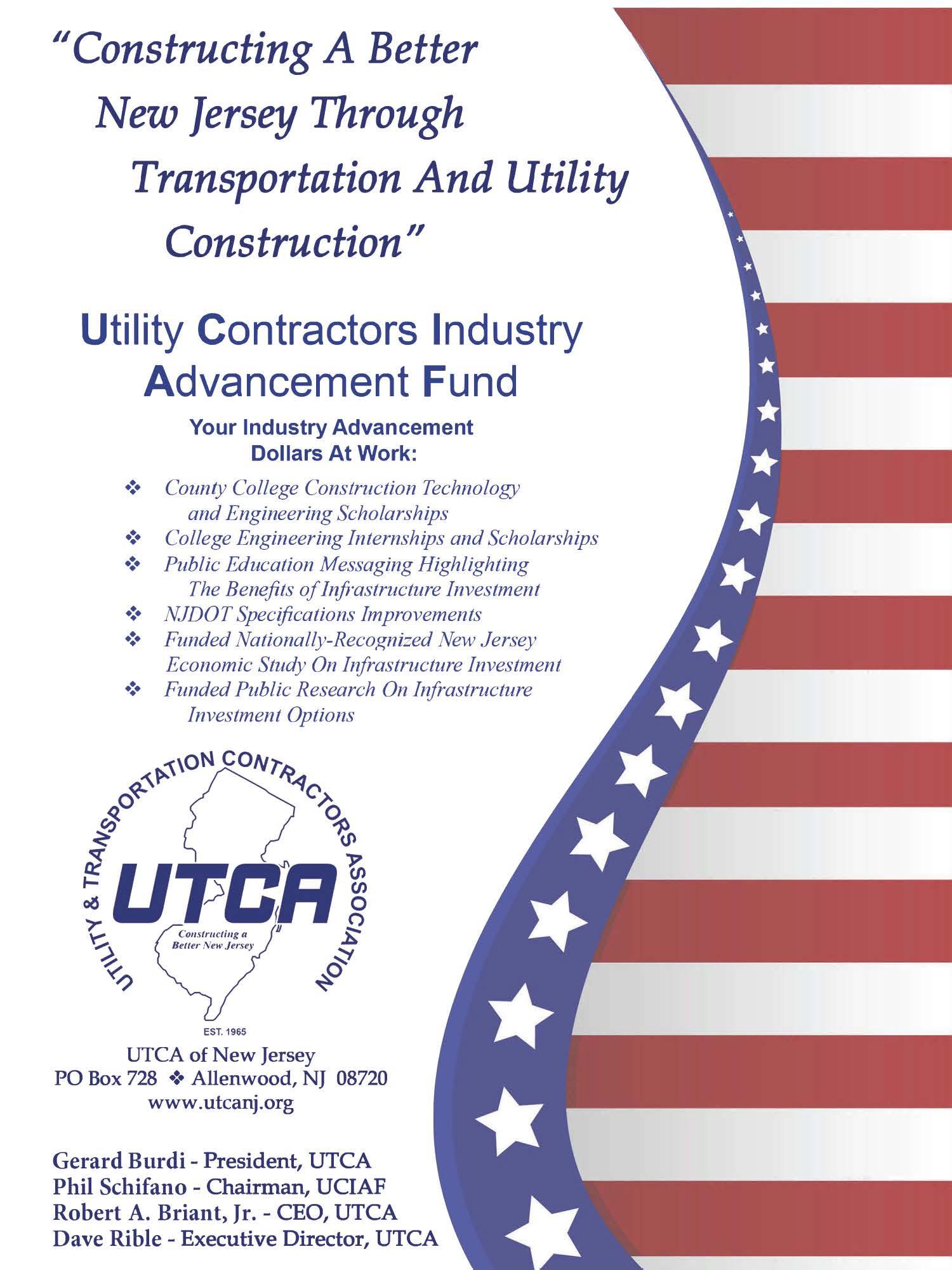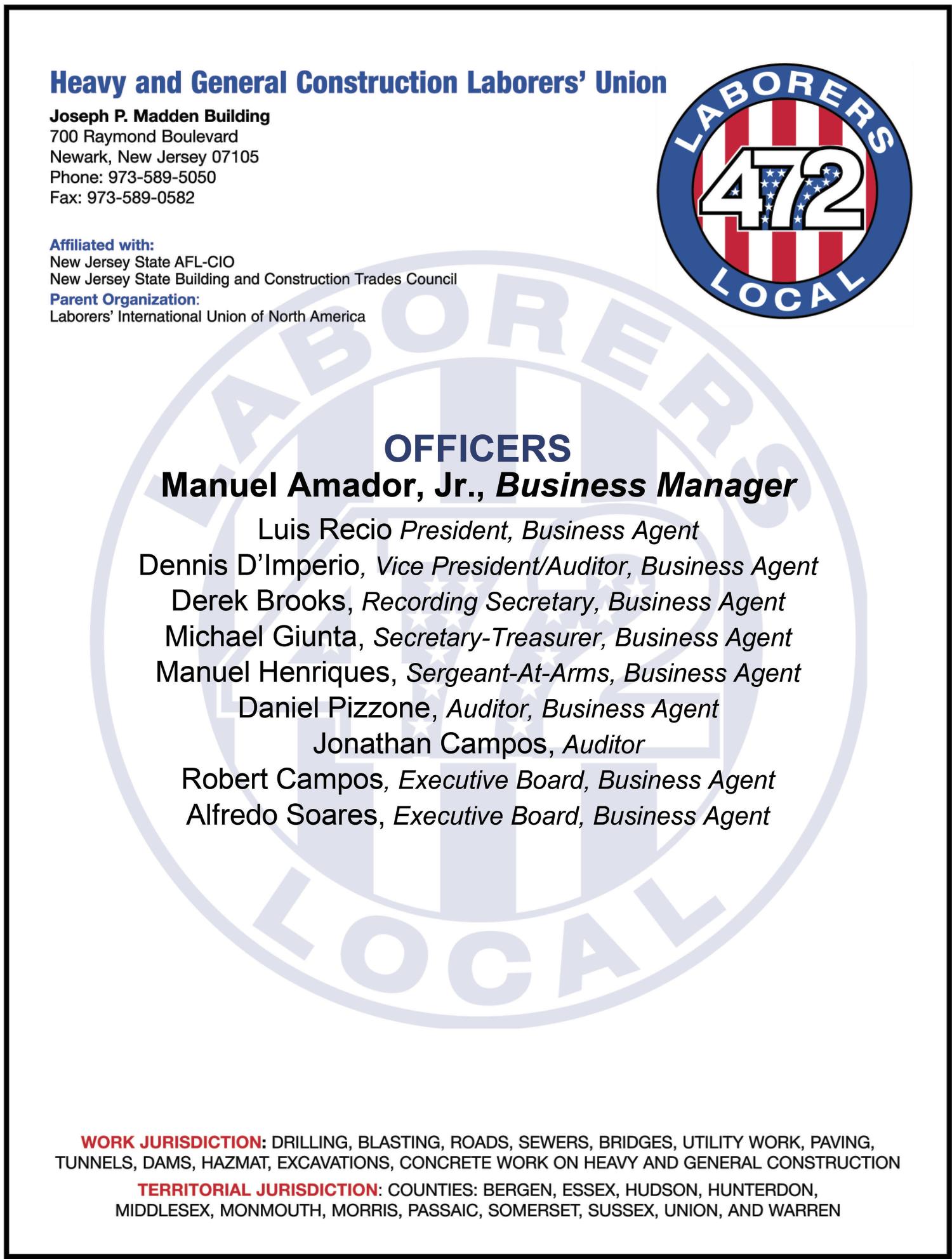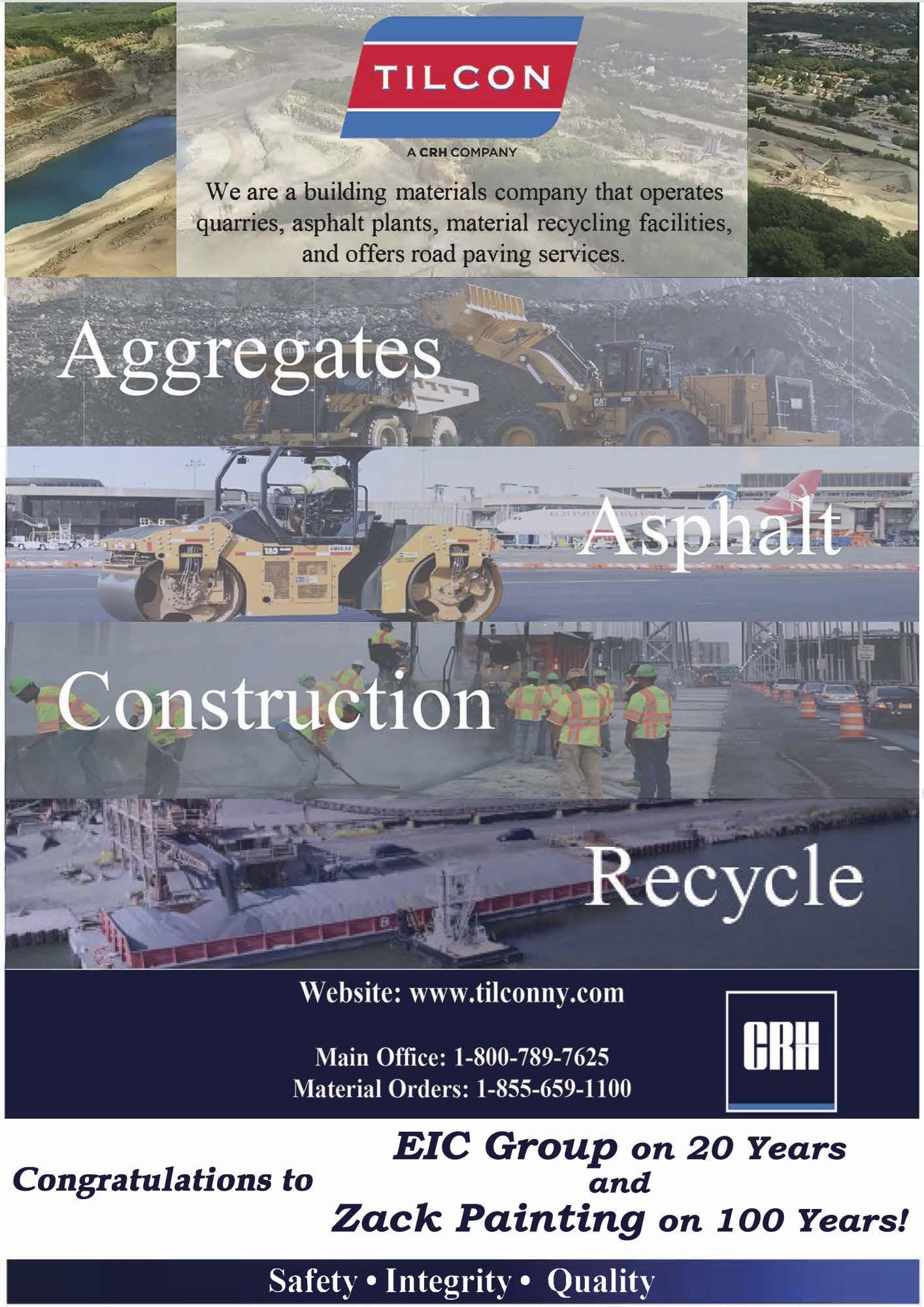
Zack painting celebrates 100 years of excellence in services that go far beyond painting
Utility & Transportation february 2024 contracTOR EICGroupLLCCelebrates TwentyYearsinBusiness Inside:
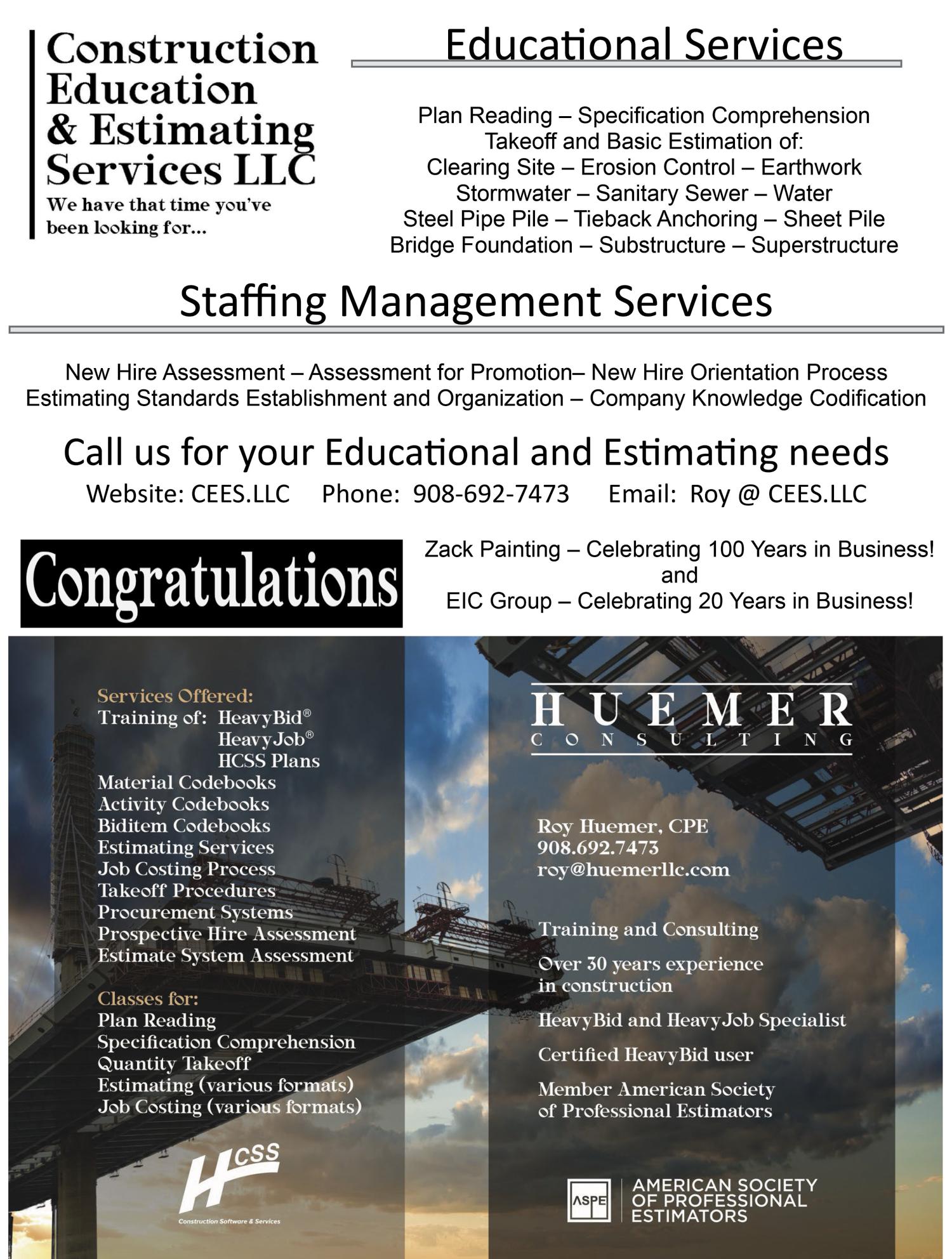
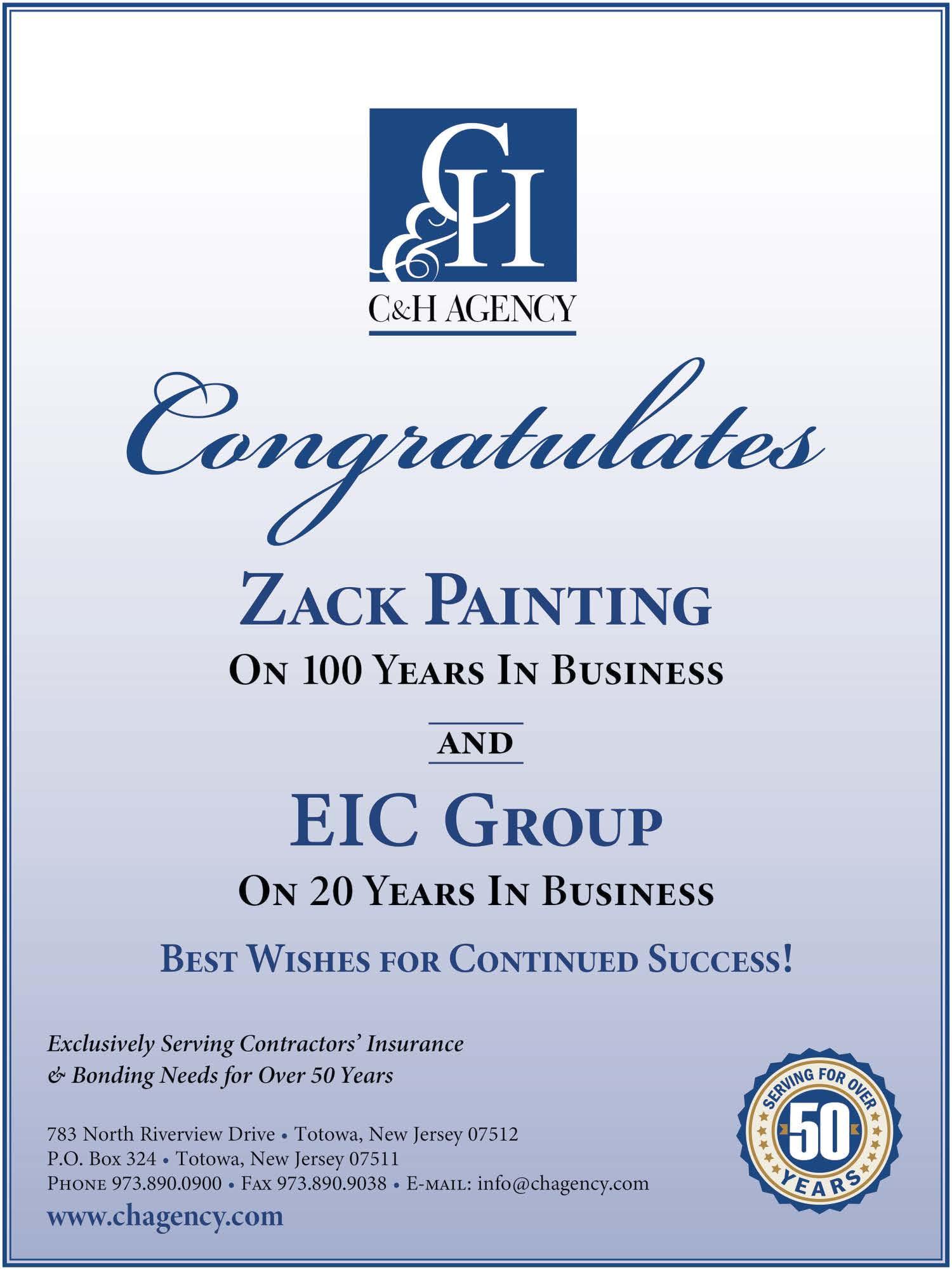

From the desk of:
gerard burdi
With the holidays in the rearview mirror, we begin a new construction season, albeit a precipitous one thus far. Notwithstanding the weather, I trust we are all able to move forward with renewed vigor for a safe and successful 2024.
The new year also begins with the UTCA sponsored safety seminars. Staff member Dan Neville oversees the planning and execution of these events and has done this seamlessly for several years. This year’s training slate includes lessons in flagging, trenching, signaling and crane standards. It is important to keep these lessons at the forefront of our construction workforce, whether it be new information or a refresher for the more experienced workers. In either case, these seminars are a great way to increase worksite safety awareness.
through the generous member contributions. This year, the allowable contribution limits have increased, and I ask all members to consider increasing their support for our industry.
This year’s legislative lame duck session was mostly quiet. Which, in one respect, is good for us in that we did not have to fight against too much legislation detrimental to our industry. On the other hand, we were unable to get much traction on the Transportation Trust Fund renewal. As I have maintained, this is of paramount importance for the transportation construction industry. We will continue to be diligent to make sure this will happen at an acceptable level of new funding and in a timely manner to avoid any lapse in funding.

We have all grown accustomed to the excellent work done by our legislative committee and staff on legislative issues. Whether it is introducing new legislation for our benefit or fighting against proposed legislation detrimental to our industry, it is a primary and necessary function of our association. The funding raised through our PAC has always provided us with the vehicle to ensure we are engaging with the Legislature. The PAC has sustained over the many years
I would like to recognize EIC Group for completing 20 years in business. This month’s issue also features Zack Painting Company which has achieved the amazing milestone of celebrating 100 years in business. Congratulations to EIC Group and Zack Painting.
Gerard L. Burdi
Utility & Transportation Contractor | february | 2024 2
president’s message

Utility & Transportation Contractor | february| 2024 3 2107 Route 34 South Wall, NJ 07719 PO Box 728 Allenwood, NJ 08720 PH: (732) 292-4300 FAX: (732) 292-4310 www.utcanj.org Published Bimonthly During 2024 Publisher: Robert A. Briant, Jr. Editor: Helene Nasdeo Editorial Contributors: Ryan Sharpe, Dan Neville Advertising Manager: Helene Nasdeo Production/Graphics: Lauren Hagan, Helene Nasdeo Circulation: Helene Nasdeo Printed By: American Plus Printers Affiliations: ARTBA, Clean Water Construction Coalition, Water Infrastructure Network UTILITY AND TRANSPORTATION CONTRACTOR (ISSN 0192-4843) is published six times a year by the Utility and Transportation Contractors Association of New Jersey, 1670 Highway 34 North, Farmingdale, NJ 07727. Periodical postage paid at Farmingdale, NJ and additional mailing offices. POSTMASTER: Send address changes to UTILITY AND TRANSPORTATION CONTRACTOR, PO Box 728, Allenwood, NJ 08720. CONTENTS 43 Cover story 42 zack painting celebrates 100 years of excellence 73 6 hr trends to monitor in 2024 DEPARTMENTS President’s Message 2 Financial Overview 7 Legal Dig 15 Accounting Corner 21 Legislative News 29 NEWS Labor relations 57 the pipeline 81 features 63 eic group llc celebrates 20 years in business
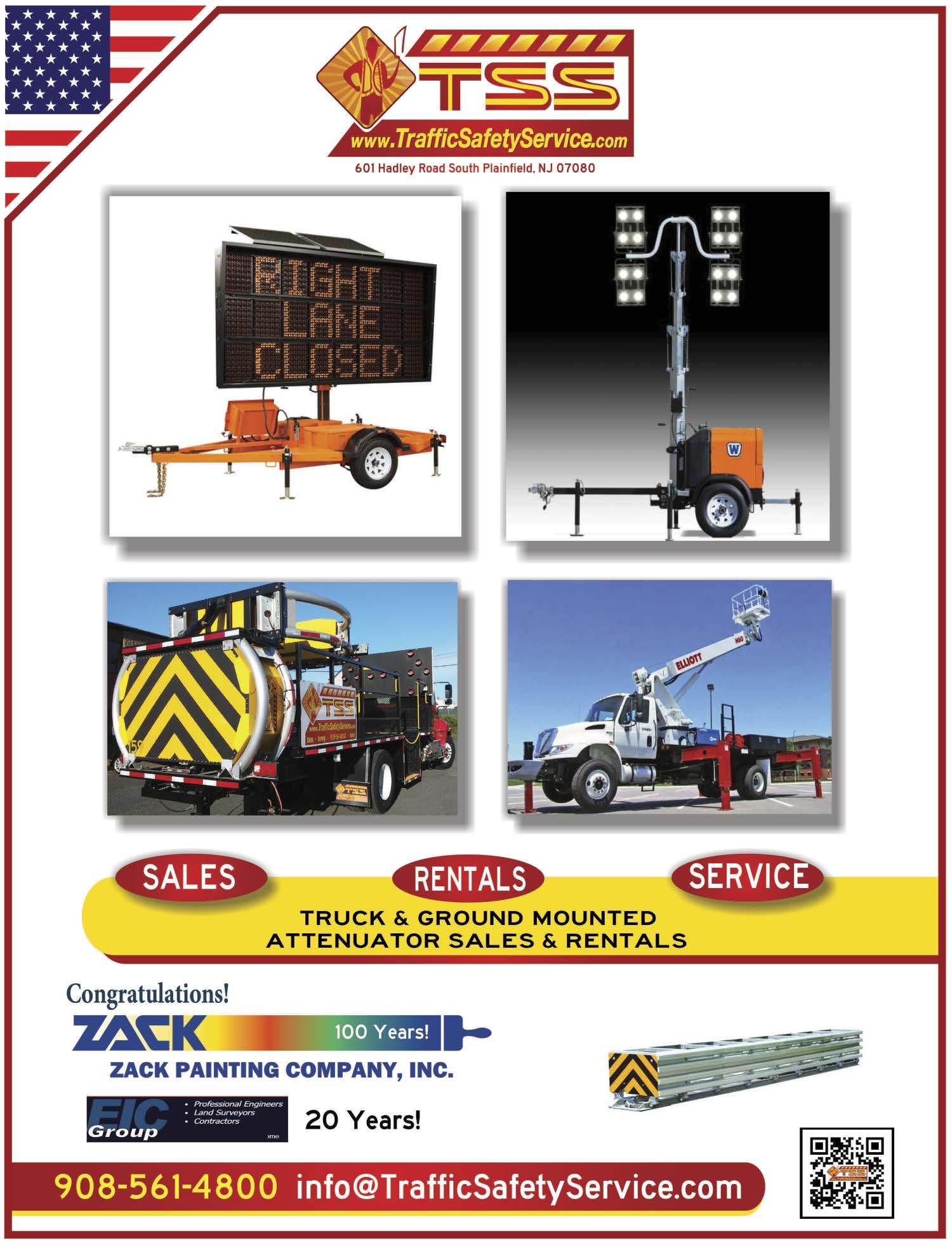
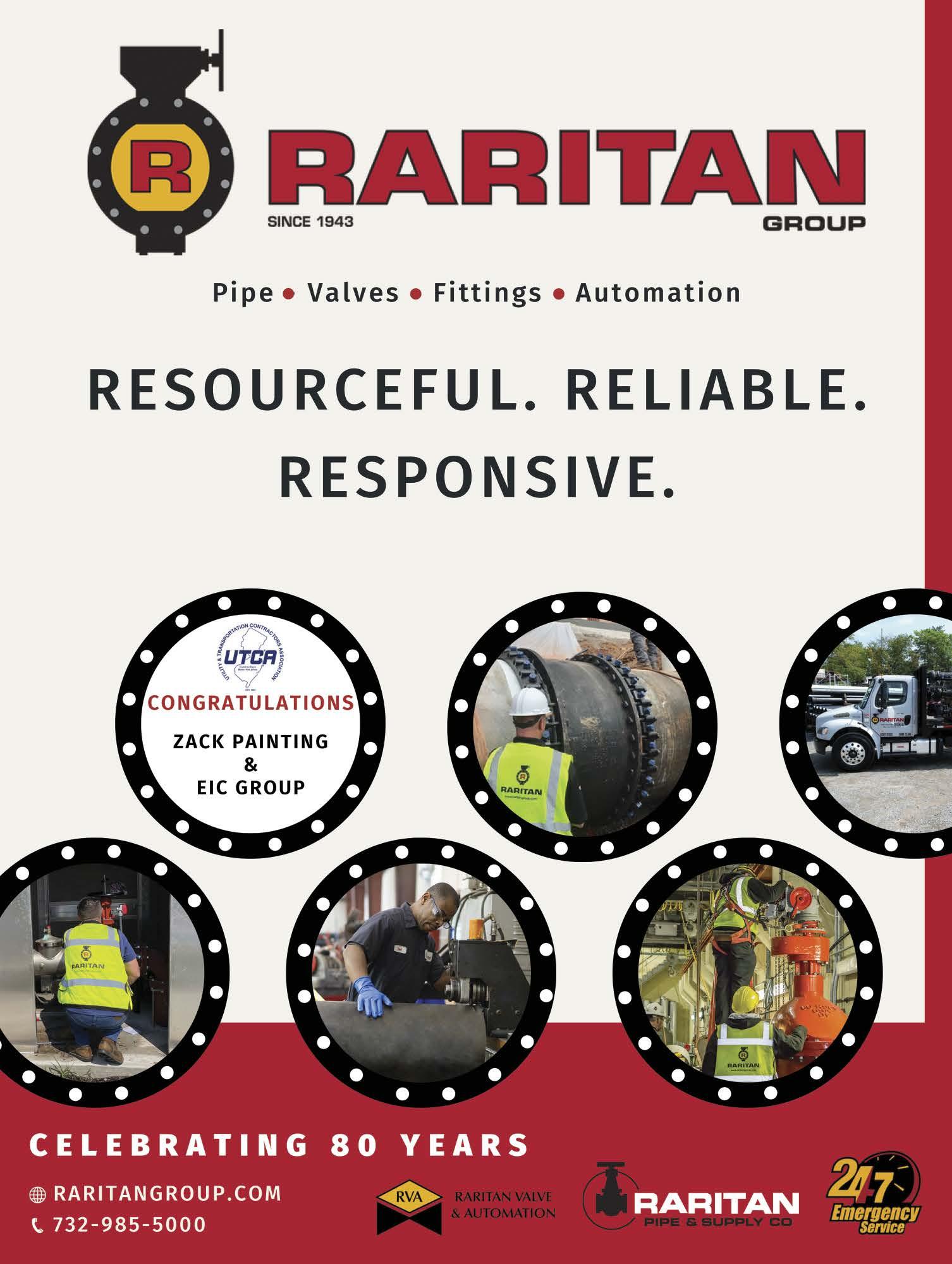


how to avoid one of the biggest retirement planning mistakes - don't run
out of money before you run out of life
by: kevin ellman, CFP, Wealth Preservation solutions
Acritical component of any solid financial plan is preparing for the future. This is why everyone needs to answer three basic questions when determining their plan for retirement:
1. When do you want to retire?
2. Where do you want to retire?
3. What do you plan to do when you retire?
The answers to these preliminary questions set the parameters for the rest of the plan. If the big day is around the corner, then planning options may be limited. However, the earlier you start planning, the more opportunity there is to develop a retirement plan that meets your needs. The sooner one begins planning, the better. Your retirement income plan must satisfy three requirements:
1. Provide steady cash flow for the duration of your life
2. Keep pace with inflation
3. Provide survivor benefits
There are many factors that come into play when budgeting for the future. How much will you need annually to pay your expenses? Are you planning to stay in your current home, downsize to a condo, or move somewhere else? How will inflation affect these expenses?
Once you have calculated your anticipated annual expenses in retirement, you need to project those expenses into the future. Basics, such as food, generally track the overall inflation rate, which has been around 3% per year. On the other hand, medical, dental and prescription drug costs have risen at a rate closer to 6% annually.
The most important and overlooked element of a retirement plan is failing to plan for a long enough life. The good news is that people are living longer so you want to make sure that your retirement strategy doesn’t run out of money.
Many retirees plan to rely primarily on fixed income investments like bonds and CDs for their monthly cash flow. Depending on how much money you have, this is where the costliest mistakes are made because there is less opportunity for growth. Owning stocks or real estate provides more opportunity for cash flow to increase over time and keep pace with inflation, but these invest-
ments come with risks. One investment to potentially consider is high dividend stock funds.
High dividend stocks can pay a dividend as high as 3-4% per year. Investing in a portfolio that consists of thousands of companies from all over the globe offers broad diversification and some protection in case an individual company runs into trouble.
Keep in mind, diversifying your investment strategy doesn’t guarantee better performance and cannot protect against loss of principal, due to changing market conditions. Speak to a professional to make sure you understand the potential risks of any investment strategy.
At the end of the day, the goal is to have you achieve financial security. Retirement planning helps ensure that you have enough money to cover your expenses and maintain your desired lifestyle after you stop working. It allows you to save and invest over a long period of time, so you can accumulate enough funds to support yourself during retirement.
About the Author… As CEO of Wealth Preservation Solutions, LLC, Kevin oversees investment portfolio design and management for the firm’s private wealth clients. As a financial advisor, he has provided the full array of financial, estate and retirement planning services to business owners, families, executives and individuals for over 25 years.
Kevin is a frequent guest speaker at both corporate, public and private group events. He regularly conducts workshops and seminars on the subjects of investment portfolio planning, retirement planning, estate planning and business succession planning. He has appeared as a financial commentator on CNBC (Morning Call, Portfolio Make-Over, Make Your Money Work, Power Lunch), and on ABC, and has been quoted in Businessweek, CBS Market Watch, Fortune Magazine and The Wall Street Journal.
Prior to entering the business of financial planning, Kevin was the Executive Vice President of Beefsteak Charlies, a 70-unit restaurant chain. Early in his career, Kevin was a professional drummer, who toured and recorded with major stars such as: Bette Midler, Barry Manilow, Richie Havens, Todd Rundgren & Utopia, Chuck Berry, Laura Branigan, Felix Cavaliere and Gene Cornish of The Young Rascals, Mary Travers, and Manhattan Transfer.
Outside the office, Kevin is an avid reader, a fitness buff and a devoted family man. He enjoys spending his spare time playing golf, scuba diving, and playing music.
Kevin is a board member of the Spirit of Harmony Foundation – Supporting & Funding Music Education
Utility & Transportation Contractor | february| 2024 7 Financial overview
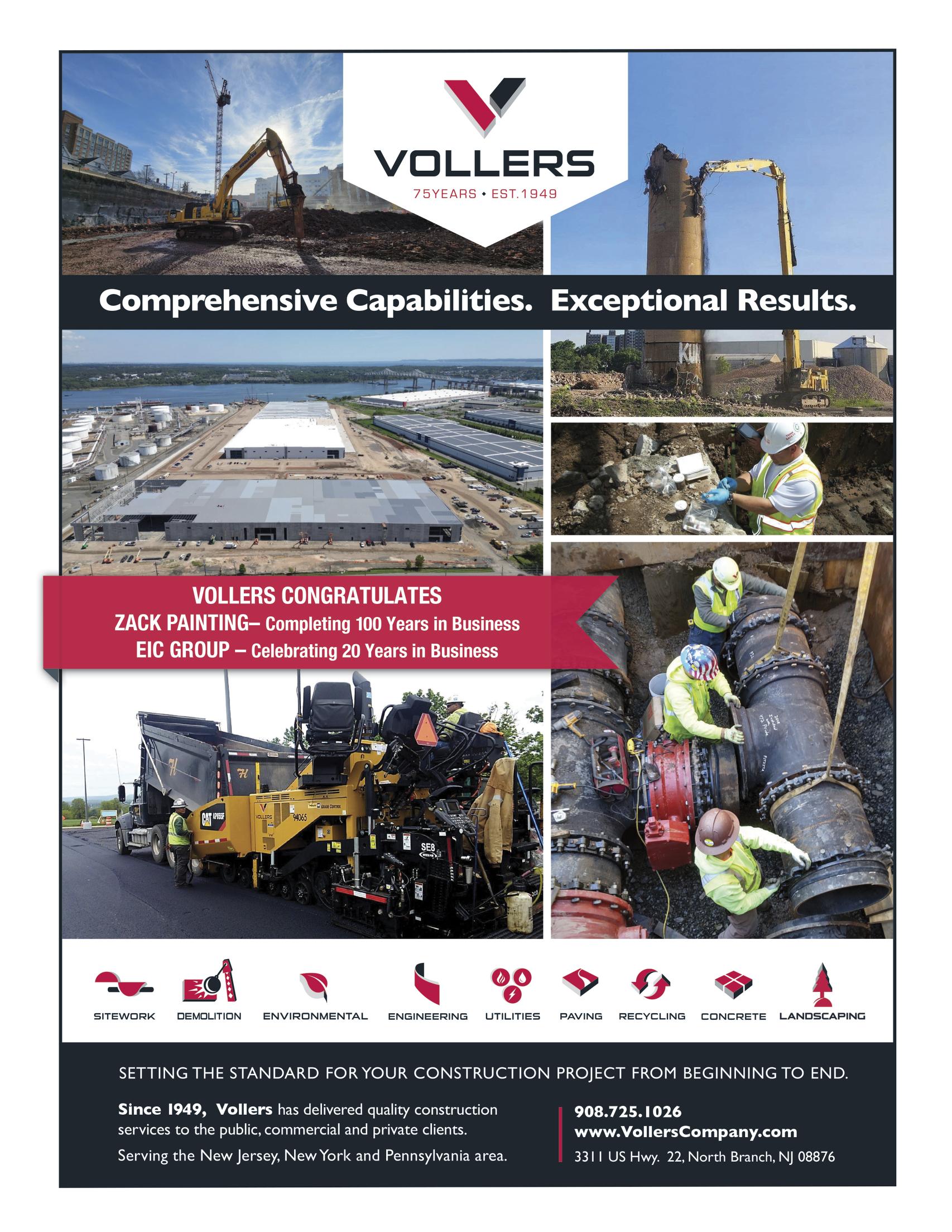

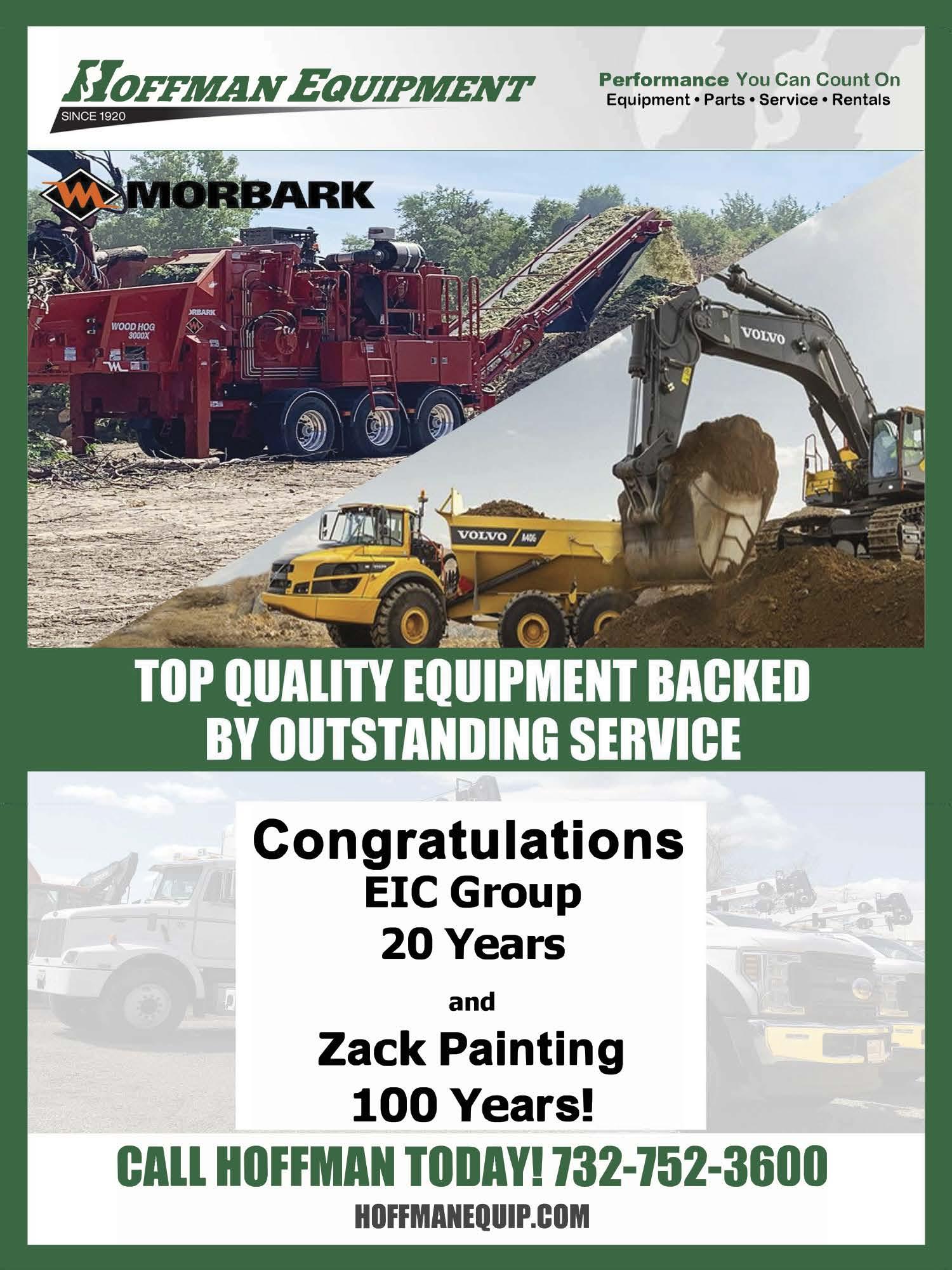
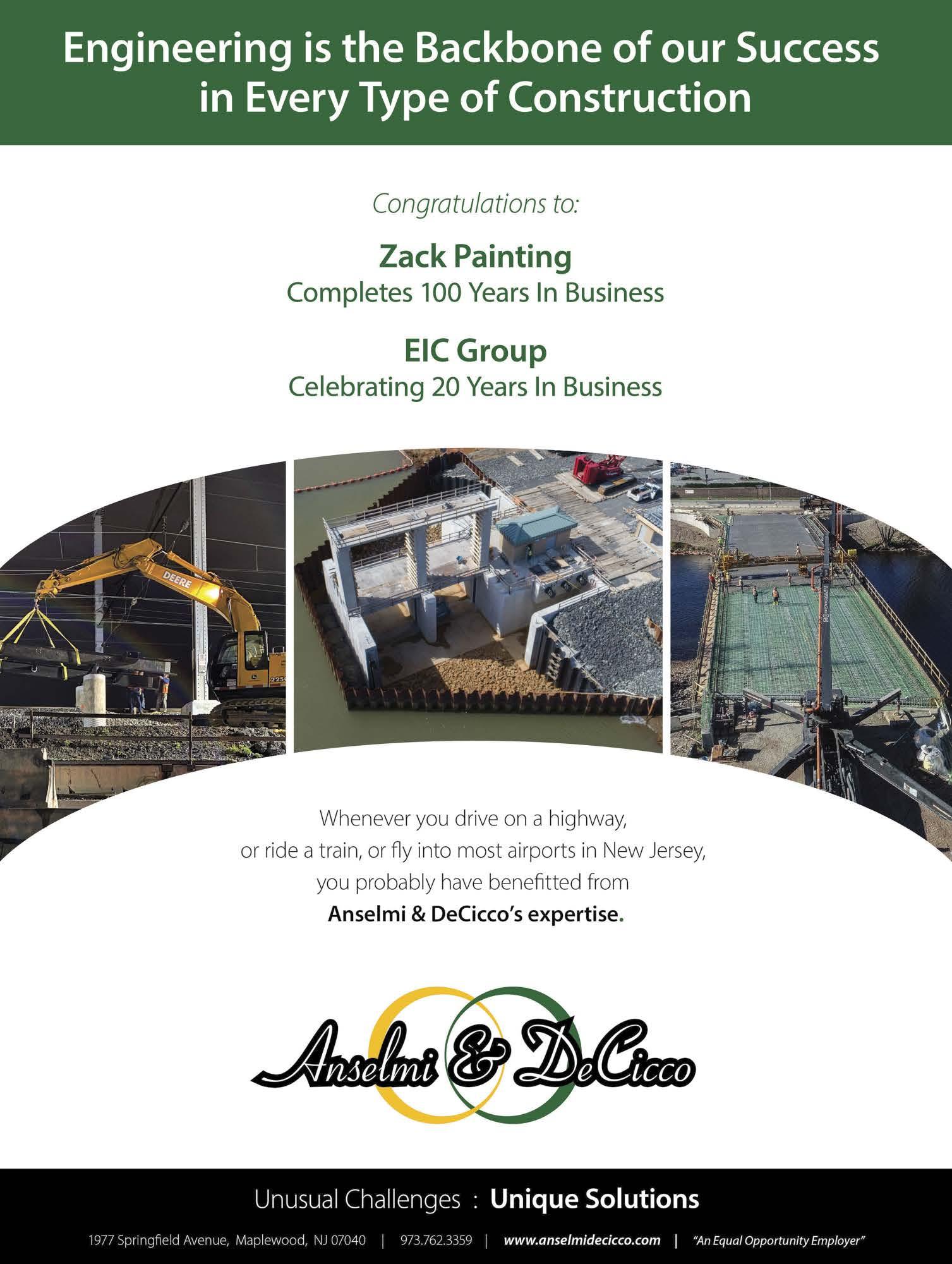

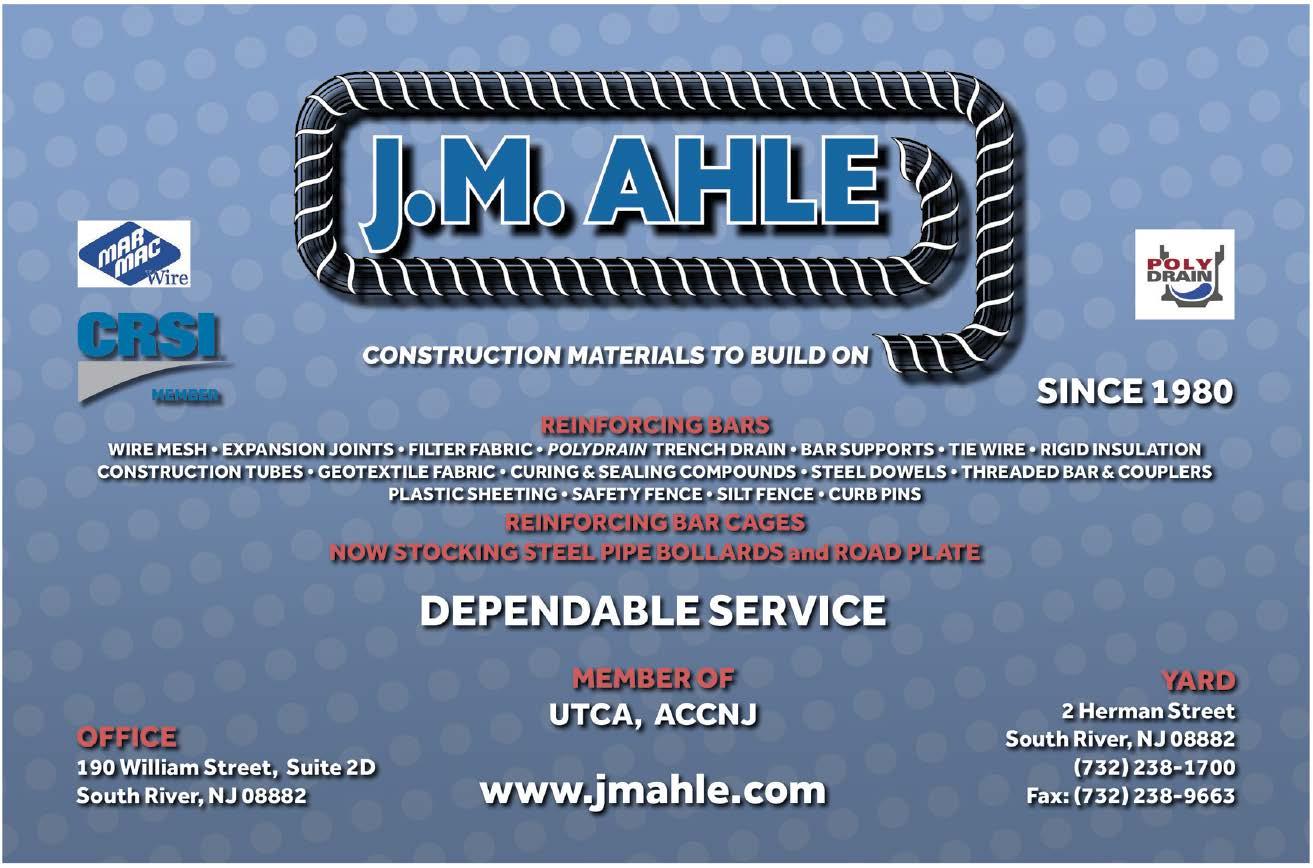
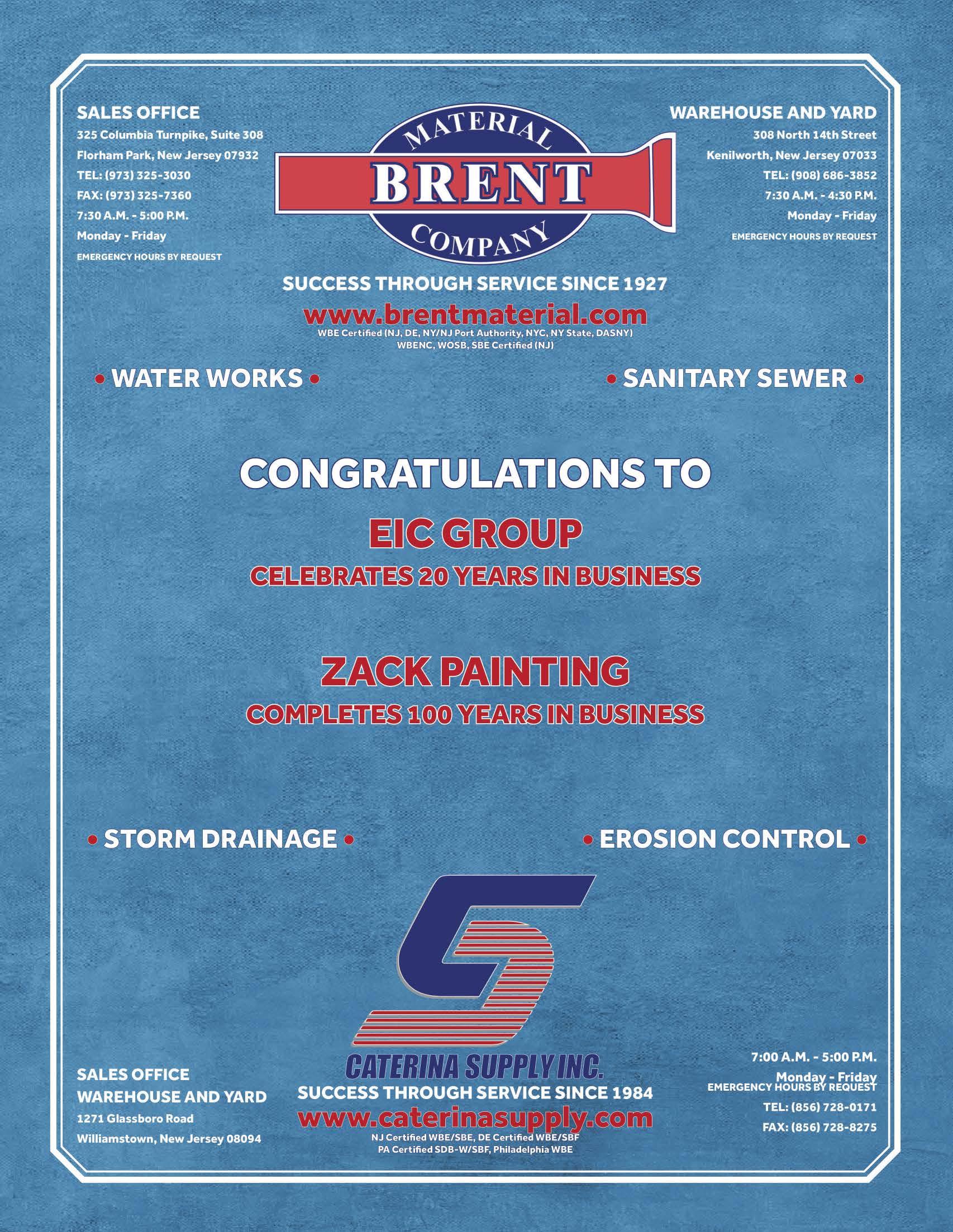
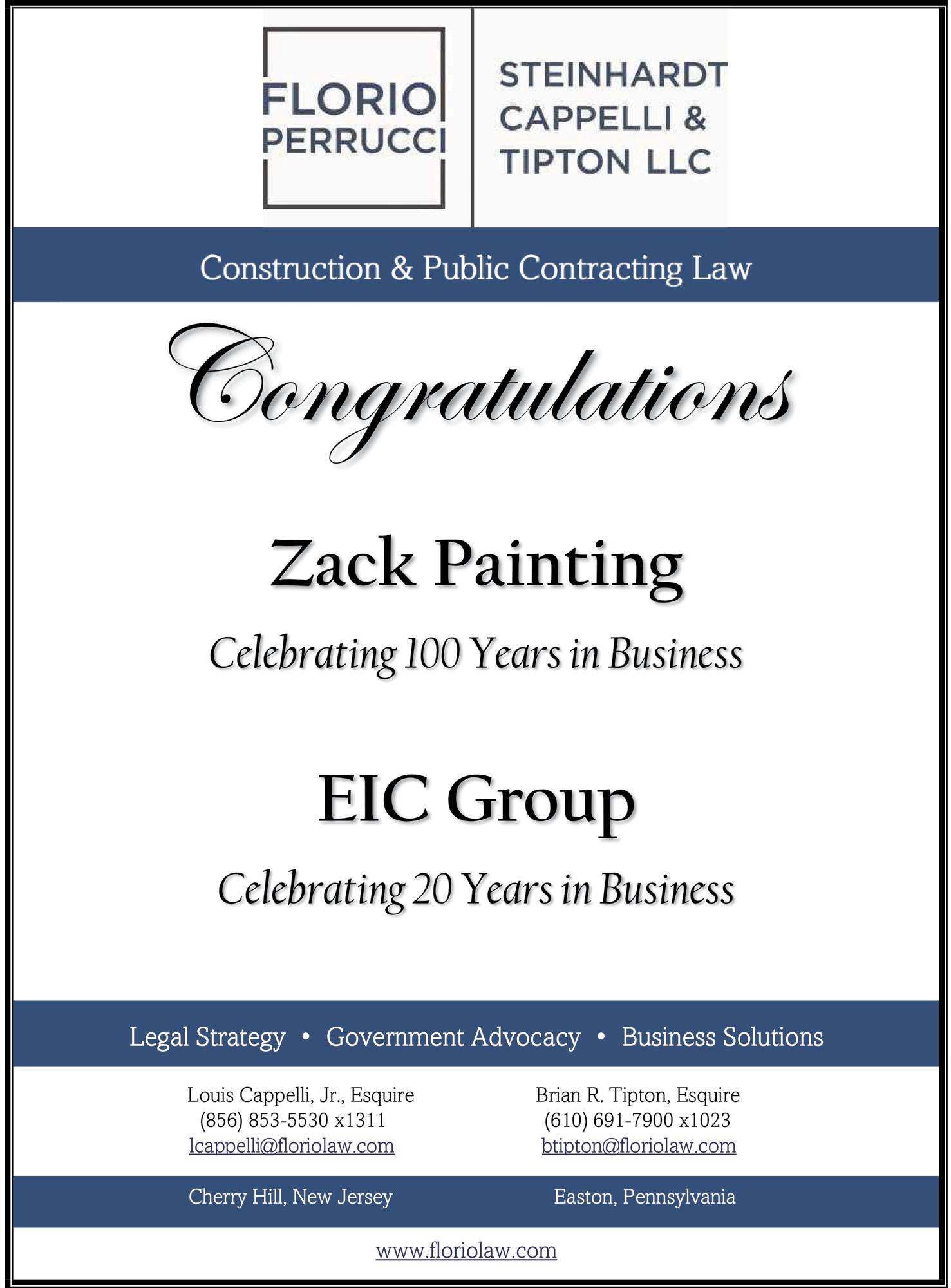

claims against licensed professionals: obtain an affidavit of merit or risk being left holding the bill
By: nicholas a. sullivan, esq.
During or after the completion of a public project, contractors may encounter a disgruntled public entity that initiates litigation alleging negligence or a breach of contract against the contractor. In turn, the contractor may believe the alleged issues with the project are due to negligence or malpractice of the engineer or architect. In this type of dispute, the contractor bringing a third-party complaint against the engineer or architect is required to obtain a legal affidavit, called an Affidavit of Merit, to proceed with a negligence or malpractice claim.
Recently, the Superior Court, Law Division of Morris County issued an opinion discussing these topics and questions in an unpublished opinion, Township of Parsippany-Troy Hills v. Thomas Controls, Inc., Docket No. MRS-L-1530-22. In Township of Parsippany-Troy Hills, the underlying dispute involved a breach of contract and negligence action brought by the Township of Parsippany-Troy Hills (“Township”), against Thomas Controls, Inc. (“TCI”) related to construction improvements to be made to the Township’s wastewater treatment plan (“WWTP”). TCI filed a counterclaim against the Township asserting, among numerous items, breach of contract, unjust enrichment, and breach of duty of good faith and fair dealing. Additionally, TCI filed a third-party complaint against Keystone, who contracted directly with the Township, alleging negligence, delay, and professional malpractice.

Keystone filed a motion to dismiss the third-party complaint due to TCI’s failure to produce an Affidavit of Merit pursuant to the New Jersey Affidavit of Merit Statute, N.J.S.A. 2A:53A-27. The Affidavit of Merit Statute requires that a plaintiff provide an affidavit from a licensed professional attesting that the actions of
the professional at issue deviated from the accepted standard of care within that specific industry. The Affidavit of Merit must be signed by a licensed professional in the same field as the defendant licensed professional and must be filed within 60 days or filed within 120 days if good cause is shown, of a defendant filing an answer. The Affidavit of Merit requirement is only applicable when the defendant is a licensed professional and the claims are for negligence of professional malpractice.
In this matter, TCI failed to file the required affidavit of merit within 60 days, or 120 days with good cause. In its motion to dismiss the third-party complaint, Keystone argued that TCI’s claims should be dismissed because TCI did not file an Affidavit of Merit within 120 days. Before Keystone’s motion to dismiss was adjudicated by the Court, TCI filed its Affidavit of Merit and argued it had substantially complied with the requirements. However, relying on a prior decision from the New Jersey Supreme Court, the trial court rejected TCI’s late filing because it was filed after Keystone filed its motion to dismiss the third-party complaint.
A crucial takeaway for contractors from Township of Parsippany-Troy Hills is an understanding that if a contractor is facing litigation from a public entity, or private entity, and the contractor believes that a third-party professional is responsible for the damages alleged by the public entity or private entity, in order to maintain a successful suit against the third-party professional the contractor must have an expert who is willing sign an Affidavit of Merit certifying that the claims against the professional, if true, constitute malpractice. If a contractor fails to take such action, the contractor may waive its claims against the third-party professional and be held liable for all the damages alleged by the plaintiff.
Moving forward, it is critical for contractors to carefully review claims made against the contractor, carefully review whether someone else may be liable for the alleged damages, and if there may be liability to a licensed professional, the contractor must work quickly to receive and submit an Affidavit of Merit.
About the Author . . . Nicholas A. Sullivan, Esq., is an Associate in the Cherry Hill office of Florio, Perrucci, Steinhardt, Cappelli, & Tipton, LLC. He may be contacted at nsullivan@floriolaw.com
Utility & Transportation Contractor | february| 2024 15 Legal Dig
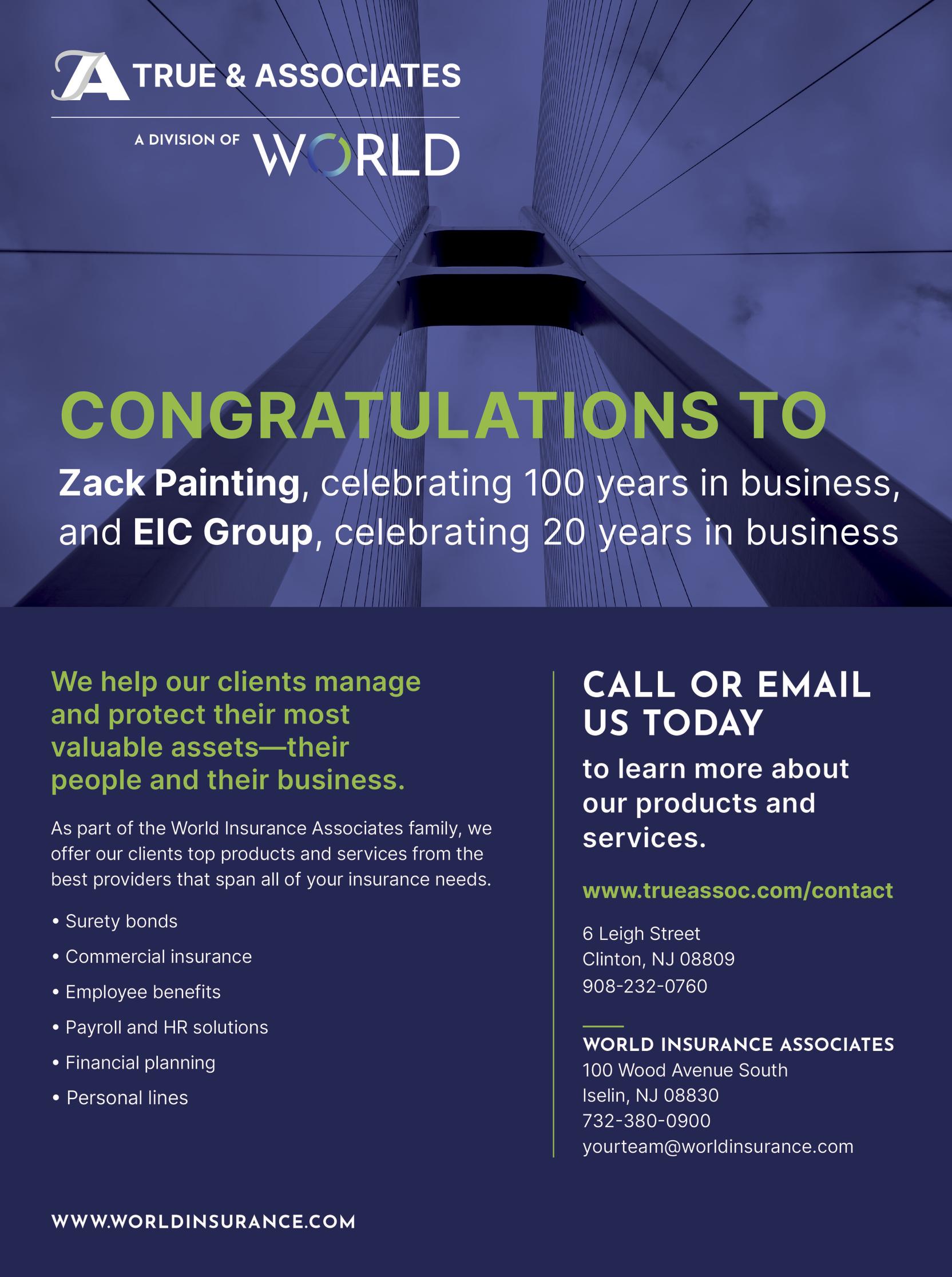
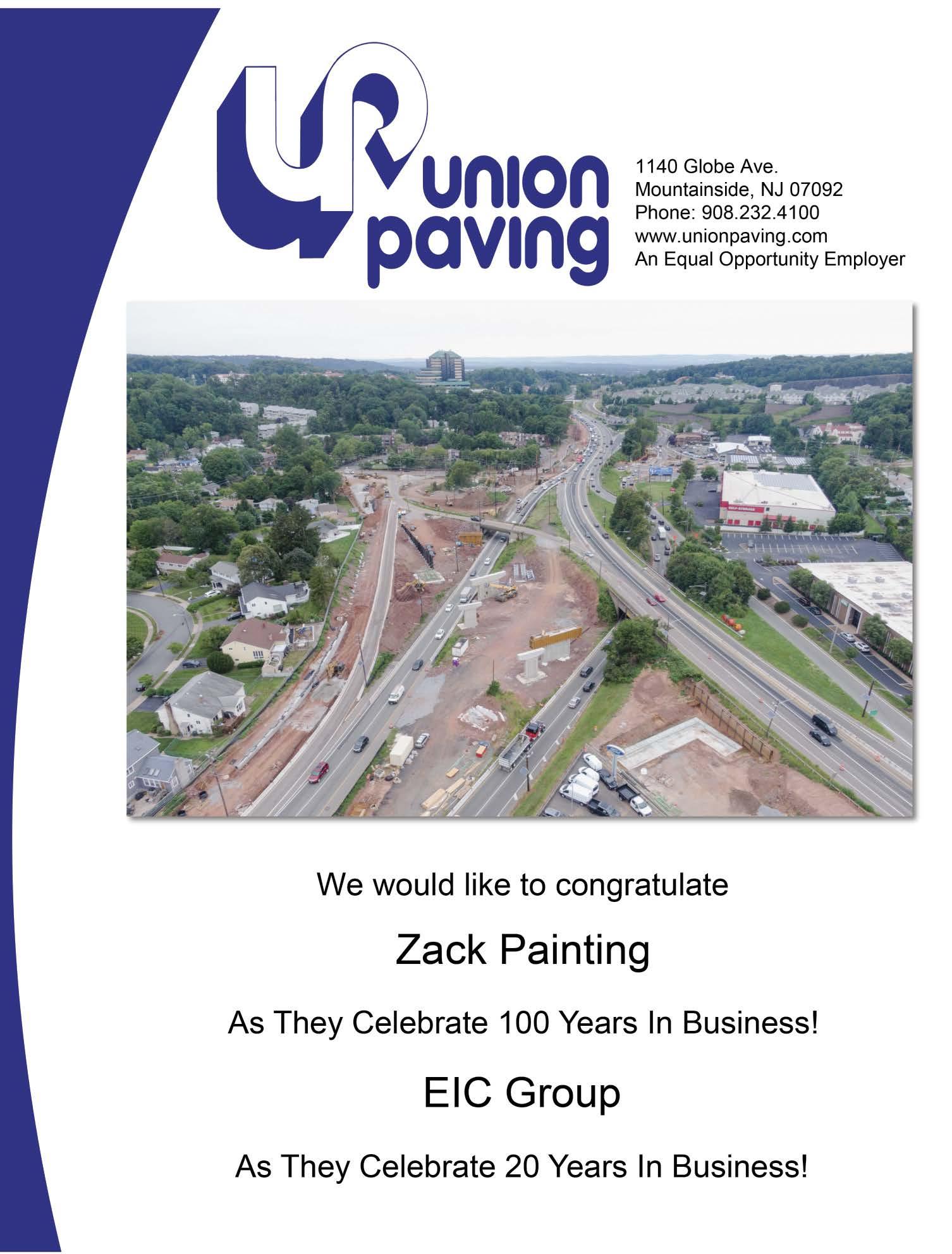
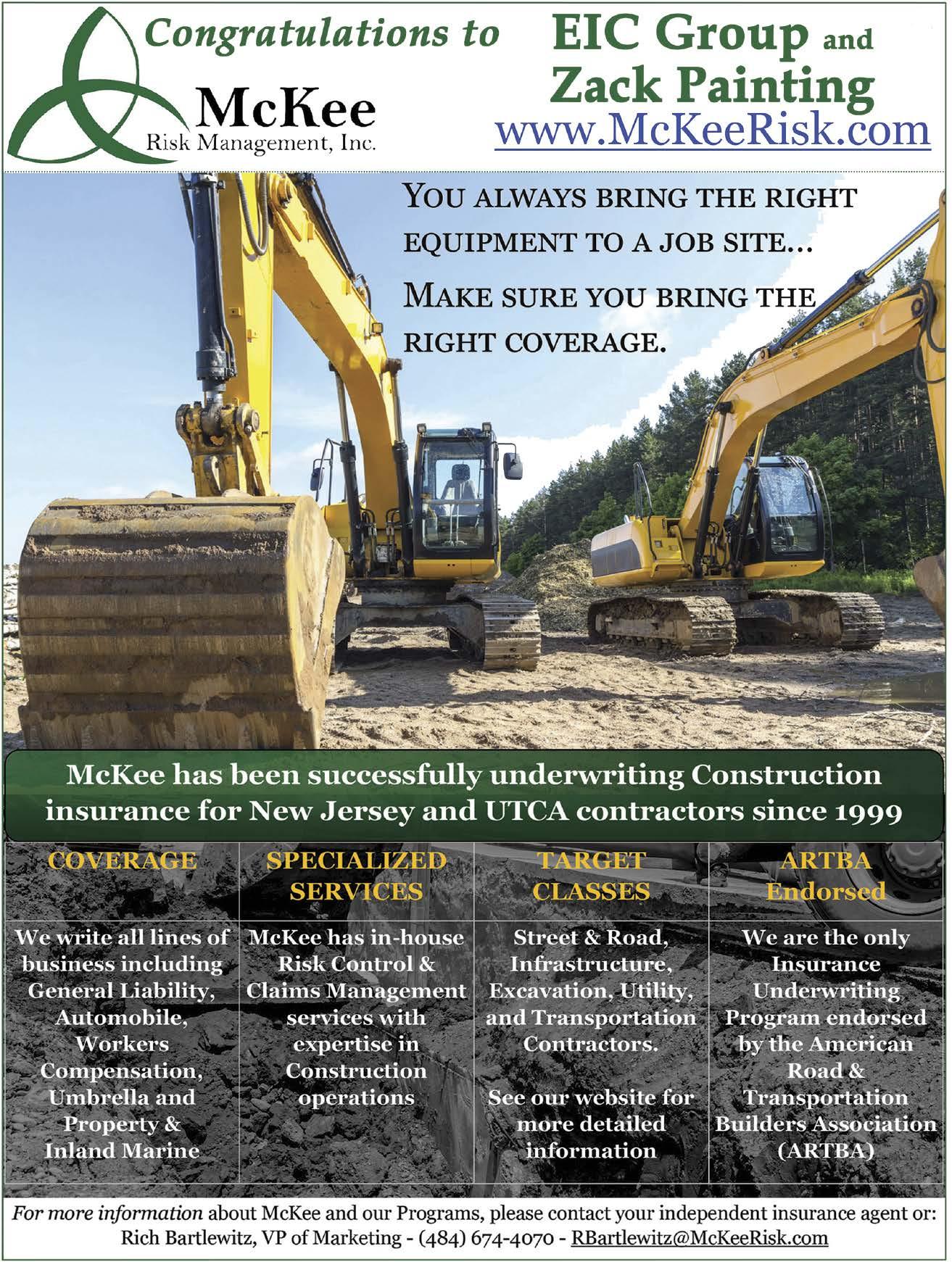



a time for reflection
By: Jack callahan, Cpa
What makes the construction industry so special is its sense of lineage. Its foundation in "building" both literally and figuratively. Building structures. Building relationships. Building a future for families and for communities. From a business perspective, my construction lineage began 44 years ago at Price Waterhouse. It was 1984 when I joined Tony Pascale in his start up consulting firm managing surety claims administration. Along with Michael Lipari, Amy Benbrook, and Tony Pascale, we built up a boutique construction accounting firm and in 2005, we combined practices with CohnReznick. We have had the honor of serving as a trusted accounting advisor to many of the UTCA member firms and have been happy to give back to the association and the industry, providing thought leadership and bringing our insights to the causes championed by UTCA and its members.
A beautiful chapter in my construction story is coming to a close as I will be retiring January 31, 2024. It brings me comfort to share that I am leaving you all in good hands with Mike, Amy, and their CohnReznick teams, who will ensure the continuity with our UTCA friends and clients, as well as our new Construction Industry Leader, Scott Damiecki who will also be looking to engrain himself within this cherished organization. As part of my reflection, I’ve thought back to how much the industry has changed, as well as all of the constants that remain. Read on for the eight trends I’ve found to be most impactful to the future of the industry.
Building a better tomorrow, together: Firsthand observations based on 40+ years in the industry
The construction industry and the UTCA membership have gone through a tremendous amount of maturation, ignited by economic dynamics, global supply chain challenges, legislation, and technology. Below are eight of the most impactful shifts in the construction market, providing both challenge and opportunity to today’s construction leaders:
1) Government funding has increased, and we continue to see volatile peaks and valleys on the stream of work. I like to say we have seen a “politicalization” of construction. We have long seen the movement of work around the state based on political results, but we now have the federal government becoming the funding source for a large number of projects that, historically, would not have been thought of as government contracts. While
this federal funding looks like it will bring a great deal of additional work it has been slow rolling out. This federal work will also come with a great deal of contract compliance challenges which must be understood and monitored.
2) Shifts in labor force age demographics. The statistics on the percentage of union work force that will reach retirement age in the next seven years are staggering. I saw a recent report that 41% of today’s construction workforce will reach retirement age by 2031. Furthermore, the new, young talent has been difficult to attract and retain. Many of our clients’ labor force is made up of workers marking 20 to 40 years of service. Current trends don’t indicate that will be the case with the new workforce. Contractors must exercise best efforts to be viewed as an employer of choice and they must also be viewed by subcontractors as a prime contractor of choice.
3) Technology has and will continue to have a material impact. Much of the technology advances have been positive, however, they come with new challenges, such as cybersecurity. It’s important to note that certain federal contracts will have cybersecurity requirements built in. Technology also presents the need to upskill the current hard hat wearing construction workforce. Working with our hands is going to look a lot different in the years to come.
4) Supply chain will be more critical than ever. Buy America/ Buy American Act provisions combined with increased volume of work has put tremendous challenges on the supply chain. Pricing volatility and availability of material can really have a negative impact on a contract. Now may not be the time to always search for the lowest price. Find a fair price supplier, pay them on time, and develop a relationship of trust. It will pay more dividends than a lower price over time.
5) Banking and financing for the construction industry has long been a volatile topic. Banks and financing institutions go through cycles, and it seems every so often construction becomes a blacklined industry group. We have established ourselves with the banking community as a firm that is consistent and reliable. As such, we have strong connections to those banks and, more importantly, those bankers who understand construction. The last few years saw low interest rates and easier credit availability. I hope you took advantage and are aligned with a solid bank in what clearly is now an uncertain banking market.
Utility & Transportation Contractor | february| 2024 21 Accounting Corner
Accounting Corner
6) Surety and insurance continue to be a lifeline for most UTCA contractors. Most of the public work projects require surety bonds and the cost of insurance is a significantly higher percentage of costs than it was in the past. As with banking, you need a solid relationship and an environment of trust with your bonding and insurance agents and companies. That trust is a two-way street. Be honest and forthright, commit to getting your financial statements out on time. If you have a challenging job or need to take distributions, make sure everyone is aware before they see it in the financials. Dealing with your surety is one instance where it is much better to ask for permission than beg for forgiveness.
7) Legal representation is more critical than ever for the contractor. Contract terms and subcontract agreements are increasingly complex. Compliance provisions expand all the time and, as cost of money and uncertain real estate market challenges persist, we will see more claims and thus more litigation. Your attorney must be someone that will provide guidance and direction up front and then be a pitbull when the going gets tough. They also need to have not only the expertise but the support resources to stay on top of all the required notice provisions and compliance challenges.
8) The need for a construction specialist to provide your financial, assurance, and tax needs has never been more critical. Your accountant has to be on top of the accounting and tax standards but also keenly aware of the impact on the users of your financial statements, the surety, bank public agencies, and others. The last few years on the assurance side we faced the impact of both lease accounting and revenue recognition. We at CohnReznick went to great lengths to educate not only our clients but also the banks and bonding companies. Through that preparation and education, we had no surprises when those changes were implemented. The Paycheck Protection Program loans and the Employee Retention Credits also brought, and continue to evidence, great uncertainty. Through our efforts to educate our clients, we were able to provide timely guidance to help ensure they were able to secure funding that they were appropriately entitled to. Remember that both of those plans have long audit timelines and in this year of an election we will hear more about actual and purported fraud with these programs.
A final word to the UTCA community
One of the first professional organizations that I got involved with was UTCA of New Jersey and I have been thankful for all the benefits that I have derived from my membership and involvement. It became clear to me all those years ago that this construction industry and the UTCA community is a proud group of family-owned businesses. I have been privileged to be welcomed as part of this big family. Some of my dearest friends were and are members of this amazing group. I have seen the growth, the collapse, and the rebirths of many of these family businesses and have been honored that my team has been given the opportunity to make our contributions to, in some cases, the third generation of family owners. I encourage all of you reading this to get involved with the UTCA and its leadership. I’ve never looked at my business development efforts as selling services but
rather as selling myself, my partners, and the amazing group of construction accounting professionals that I have surrounded myself with; Letting prospects and clients know that we share their concerns, know the issues, and have been and will be there to help them manage through the good and the challenging times.
I often say that the success of a contractor depends on their family – brothers, sisters, wives, husbands, and children – all pulling together to support the family business, each in their own unique way. It is equally as critical that the contractor surround themselves with a core team of trusted advisors that know and are committed to their specific business and the industry. In my opinion that team needs to include the accountant along with attorney, banker, insurance, and bond agent all willing to work collectively to bring their unique perspectives and insights into the short- and long-term decisions that continually face the contractor. You don’t need a group that will endorse all ideas and initiatives unchallenged. You need a group that can pick apart ideas, bring you their concerns and opportunities through their own lens, have open debate, then all get behind the collective decision ownership has made. You need a family – both genetic and chosen. I thank you all for being a part of my chosen family.
It has been a great run for me. I have enjoyed the people in this industry, and it has kept me involved and active. Through all your efforts, as an accountant, I can say I built the infrastructure of New Jersey.
I heard a great quote I want to leave you with:
“Often when you think you are at the end of something, you’re at the beginning of something else.” – Fred Rogers
With retirement and the transition of appointing new leaders, it is vital we remember to embrace the movement of life and always look toward the opportunities that lie ahead.
All the best.
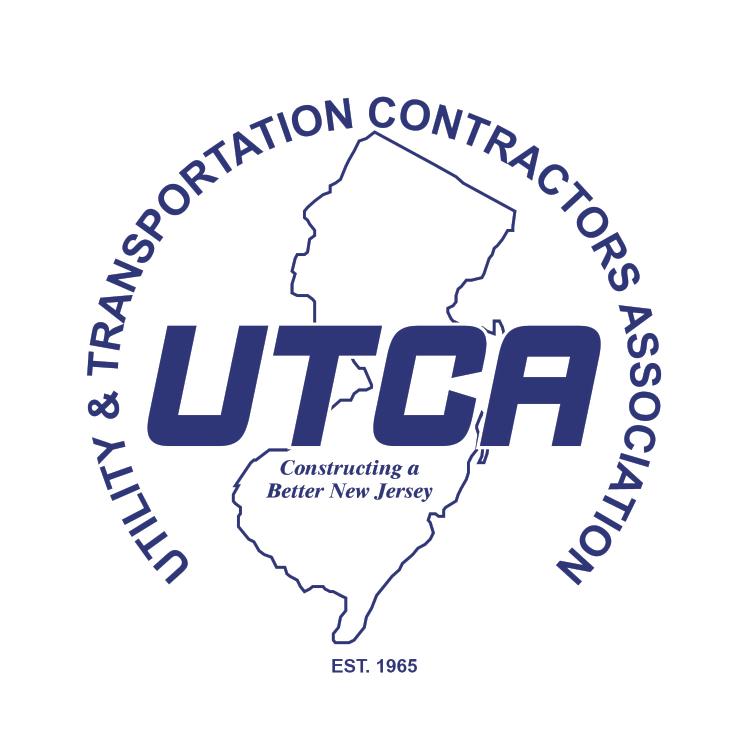
Utility & Transportation Contractor | february | 2024 22







LAME DUCK CAPS LEGISLATIVE TERM AS NEW SESSION BEGINS
By: ryan sharpe, director of government affairs and communications
With the election in the rearview mirror, the Legislature ended its two-year session with the period known as "lame duck” in which many members leaving office in a few weeks were voting on legislation before their term ended in early January.
This period is often marked by swift passage of bills, including some that are controversial, before the new Legislature takes office. With more than 30 legislators not seeking re-election, and six members losing their seats, many believed this cycle’s lame duck session would see action on some of the significant issues facing our state, including funding the Transportation Trust Fund (TTF) which must be reauthorized by July of this year.
However, the Legislature chose not to tackle many pressing issues, including the TTF. But they did engage in a flurry of legislative activity in the waning days of the term, which included passage of a bill raising lawmakers’ salaries by 67%. Under the legislation, lawmakers’ annual salaries will increase from $49,000 to $82,000, while the salaries for the Governor and Cabinet members will rise from $175,000 to $210,000 a year.
Among other bills that were considered by lawmakers ahead of the end of the legislative term are measures that allow unions to file wage claims for non-union employees, change the workers’ compensation program, expand paid family leave, amend local procurement laws, require the study of harmful chemicals in drinking water, and seek to modernize our electrical grid.
Another piece of legislation taken up by a Senate Committee would eliminate the requirement that public works contractors have a registered apprenticeship program. That bill was discussed at the Senate Labor Committee but was not voted on.
Upon the end of the term, the Legislature held its reorganization, in which the new members took their oaths of office, and the new legislative leadership was installed. Despite the many retirements and six incumbent lawmakers losing their seats, the political makeup of the Legislature will not differ substantially, with the Democrats adding to their majorities in the Assembly and maintaining their advantage in the Senate. In addition, the Leadership of both houses will largely remain in place with Senator Nick Scutari re-elected as Senate President and Assemblyman Craig Coughlin returning as Assembly Speaker.
These new leaders will have their hands full as they will tackle many challenges in the new legislative session. Among the is-

sues they will confront is New Jersey’s controversial transition to renewable energy. The Chairman of the Senate Environment Committee has indicated that his bill to implement Gov. Murphy’s plan to transition to 100% clean energy by 2035 will be considered in this session. As part of that goal, Murphy is continuing to advocate for the construction of wind turbines despite multiple wind farm developers pulling out of their New Jersey turbine projects.
The Murphy Administration has also taken steps to ban the sale of new gasoline powered vehicles by 2035 by formally adopting rules to implement this policy. While this proposal was not considered by the Legislature, it’s possible they could take up this issue and amend the Governor’s goals or deadlines. It remains to be seen if there is an appetite among lawmakers to rebuke the Governor who is entering the last two years of his term and is barred from seeking re-election.
In fact, despite being nearly two years away from the gubernatorial election, the jockeying to succeed Phil Murphy has already intensified. In December, former Senate President Steve Sweeney announced his candidacy for Governor and very quickly locked up support from a host of politicians and labor groups. Sweeney is the general vice president of the International Association of Bridge, Structural, Ornamental and Reinforcing Iron Workers and is expected to have support from the state’s building trades unions.
Other Democrats said to be considering a run for Governor include Congressmembers Mikie Sherill and Josh Gottheimer and Jersey City Mayor Steve Fulop who kicked off his campaign in April of 2022. While most candidates have not waded into policy issues, it’s worth noting that Fulop is calling for an extension of the surcharge on the state’s Corporate Business Tax with the revenue dedicated to fixing NJ Transit’s fiscal deficit.
On the other side of the aisle, 2021 candidate Jack Ciattarelli, radio host Bill Spadea and State Senator Jon Bramnick are potential candidates for Governor.
While many are focusing on the Governor’s race in 2025, there will be an election this year in New Jersey that could result in the state electing a new US Senator. With current Senator Bob Menendez facing corruption and bribery charges, multiple candidates are campaigning to be the Democratic nominee which
Utility & Transportation Contractor | february| 2024 29 Legislative News
Legislative News
would make them the heavy favorite to be elected in November. With Menendez indicating he will seek re-election, Congressman Andy Kim and New Jersey’s First Lady, Tammy Murphy appear poised to battle for the nomination through the June primary.
Of course, this year will also feature a presidential election which could be a rematch of the 2020 contest between Donald Trump and Joe Biden. While some are calling on the 81-year-old Biden to step aside, he appears to have locked down the Democratic nomination. On the other side, Trump maintains a dominant lead over his only remaining Republican challenger, former UN Ambassador and South Carolina Governor Nikki Haley.
Whoever wins the nomination will be working with a newly elected Congress which could tip the balance of power in Washington. With each side clinging to razor-thin majorities in both Houses, this past year has seen unprecedented levels of dysfunction in the capital, including the ousting of the House Speaker. The result was several near government shutdowns and the
failure to reach a budget agreement which is jeopardizing vital infrastructure projects, especially in the water sector.
As the chair of the Clean Water Construction Coalition (CWCC), UTCA has been working with our partners in this national organization to head off proposed cuts to State Revolving Funds which are used to finance critical water infrastructure needs. The CWCC has also been advocating for more funding for water recycling, surface and groundwater projects, desalination projects, drinking water for disadvantaged communities, and environmental restoration projects. Most recently, another shutdown was narrowly averted by the passage of a continuing resolution that funds government operations through March.
While the political and legislative landscape keeps changing in New Jersey and Washington, UTCA continues to closely monitor both of these sectors and is continually engaging with policy makers to ensure the voice of the construction industry is represented.
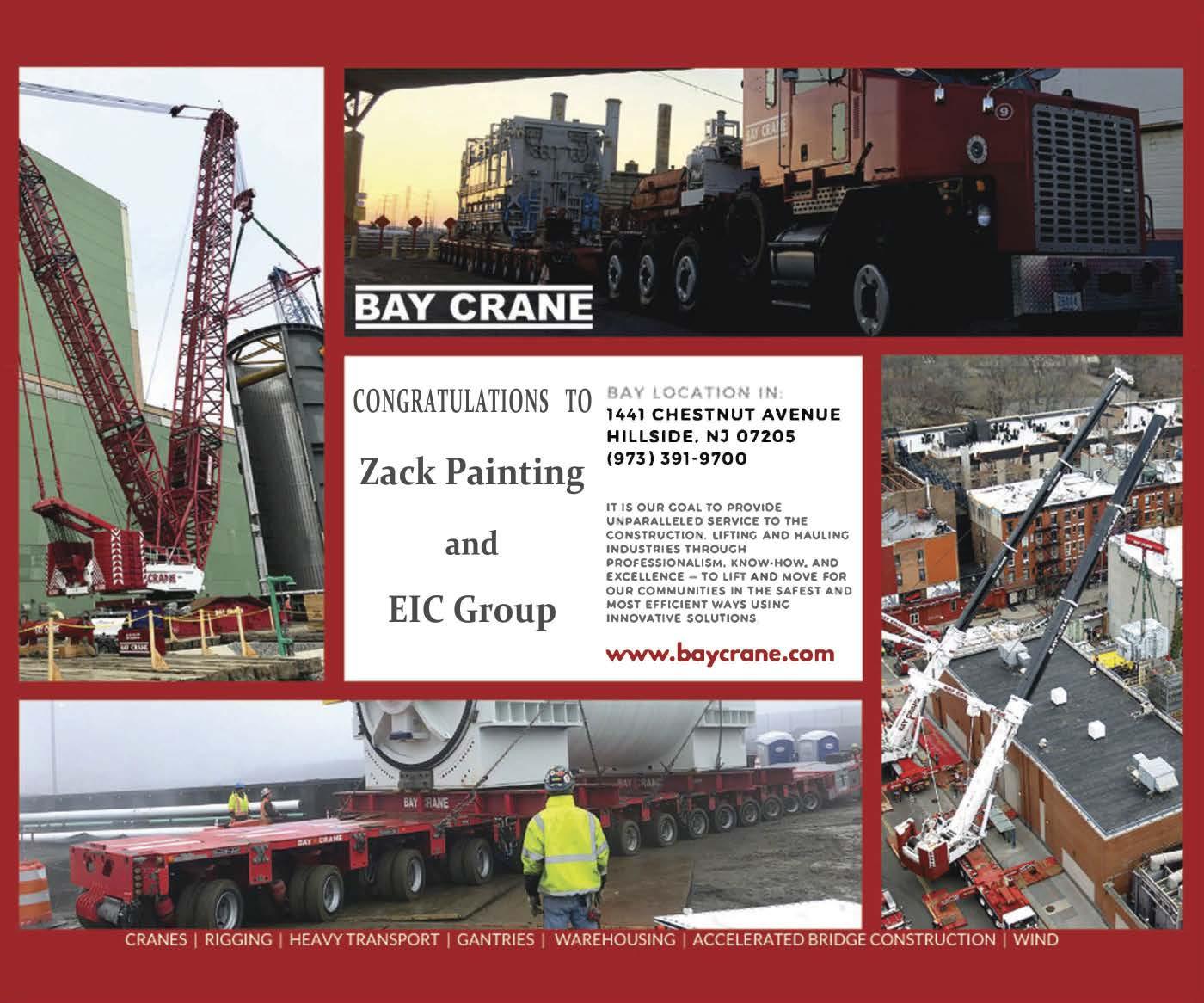
Utility & Transportation Contractor | february | 2024 30
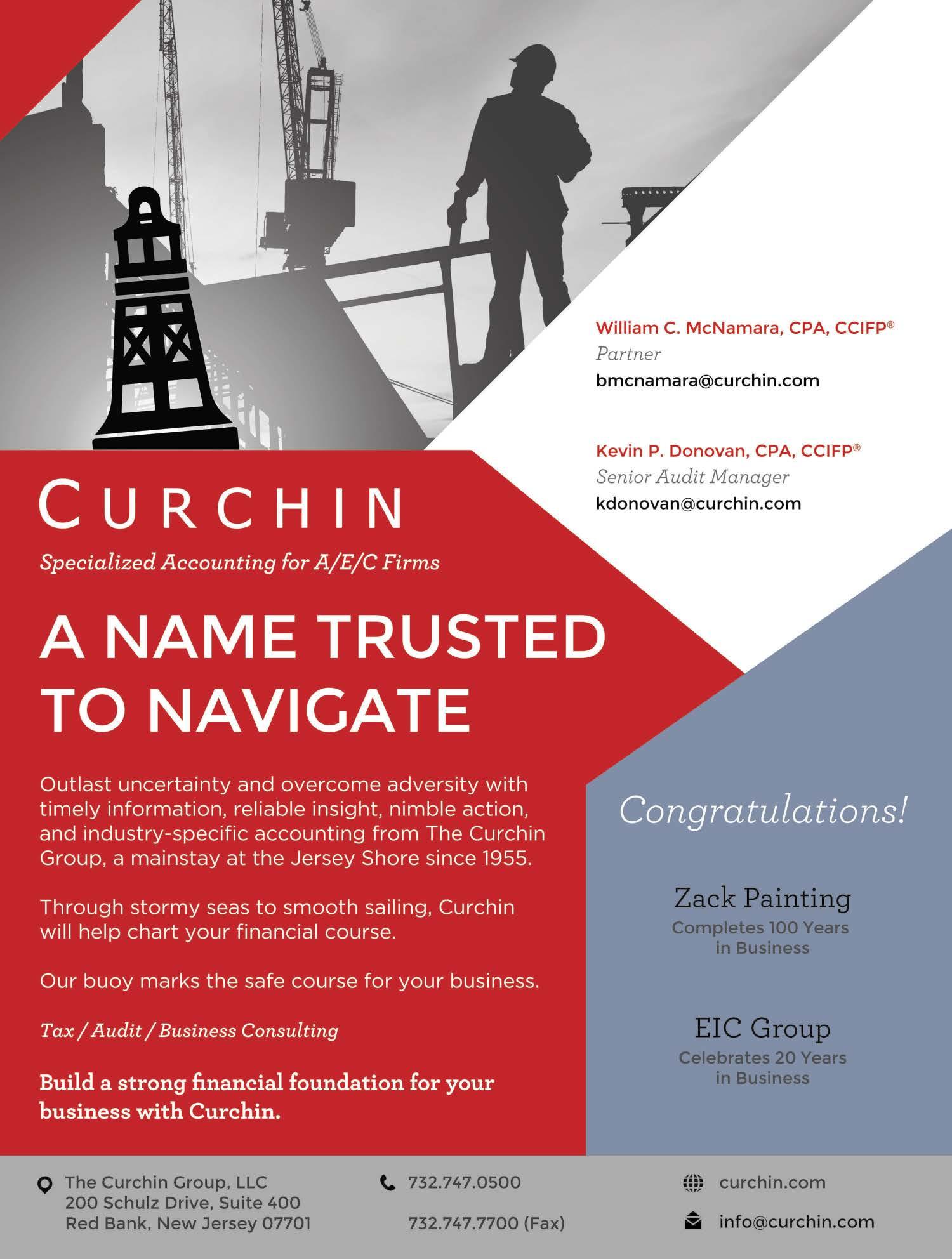

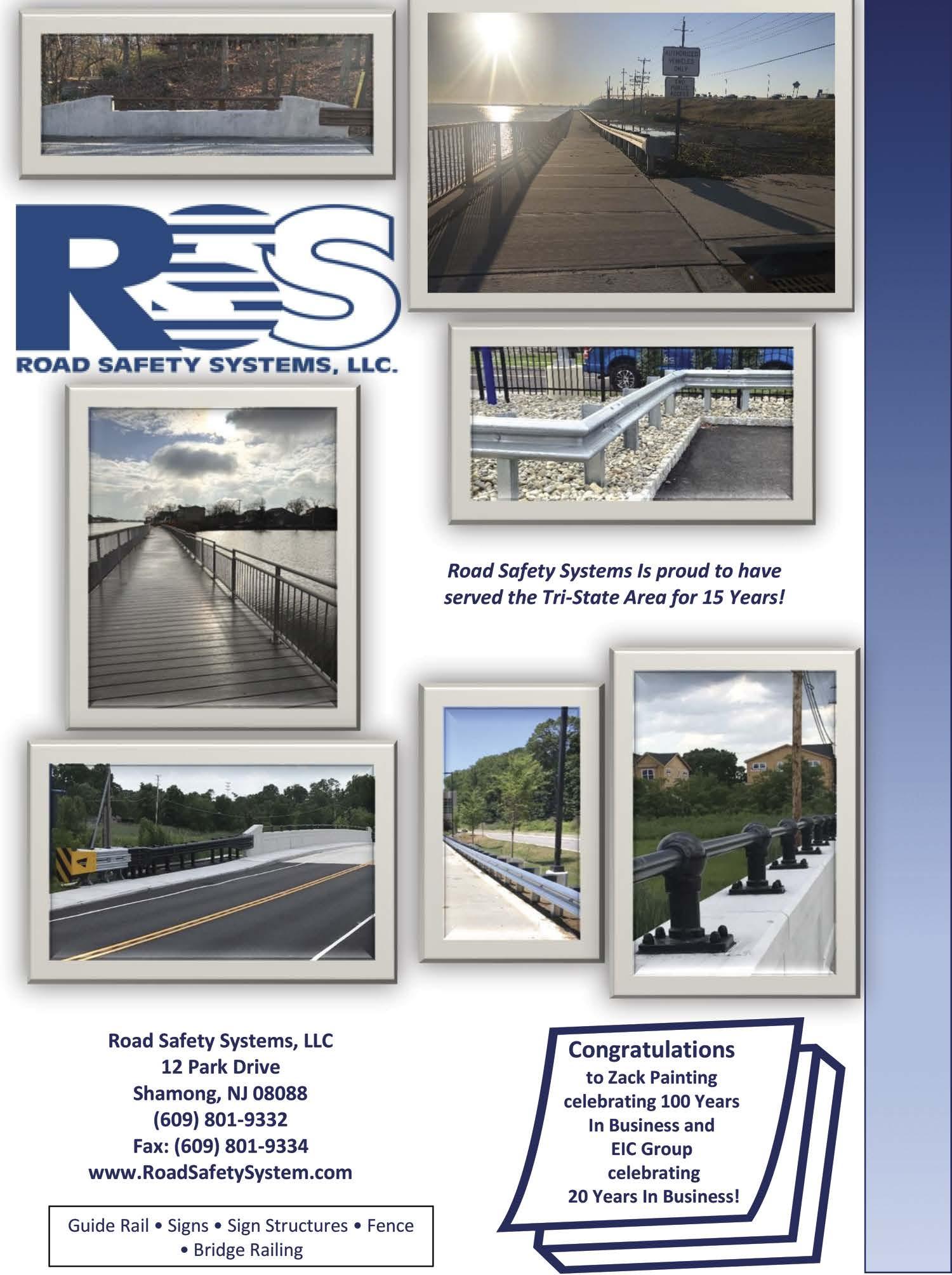
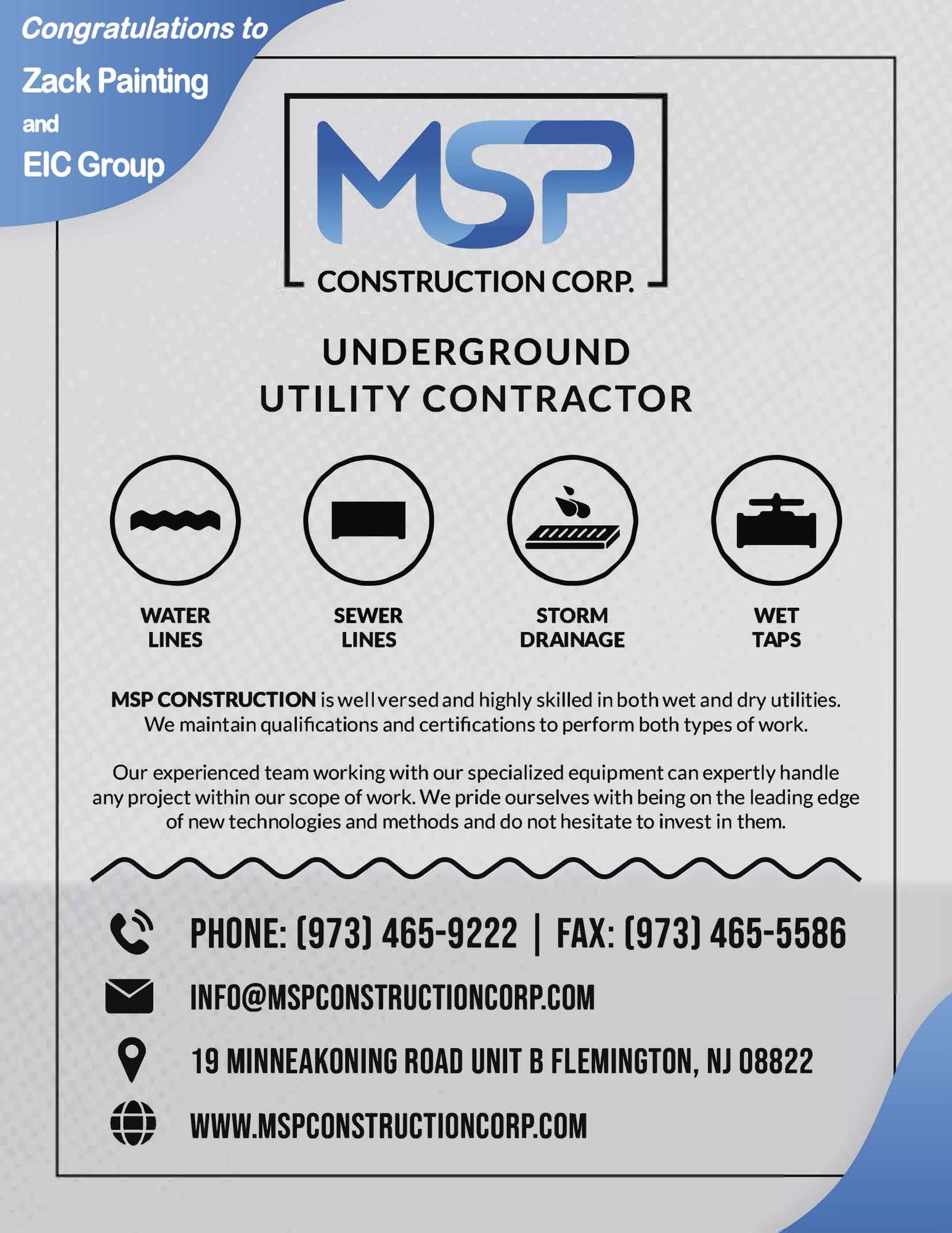
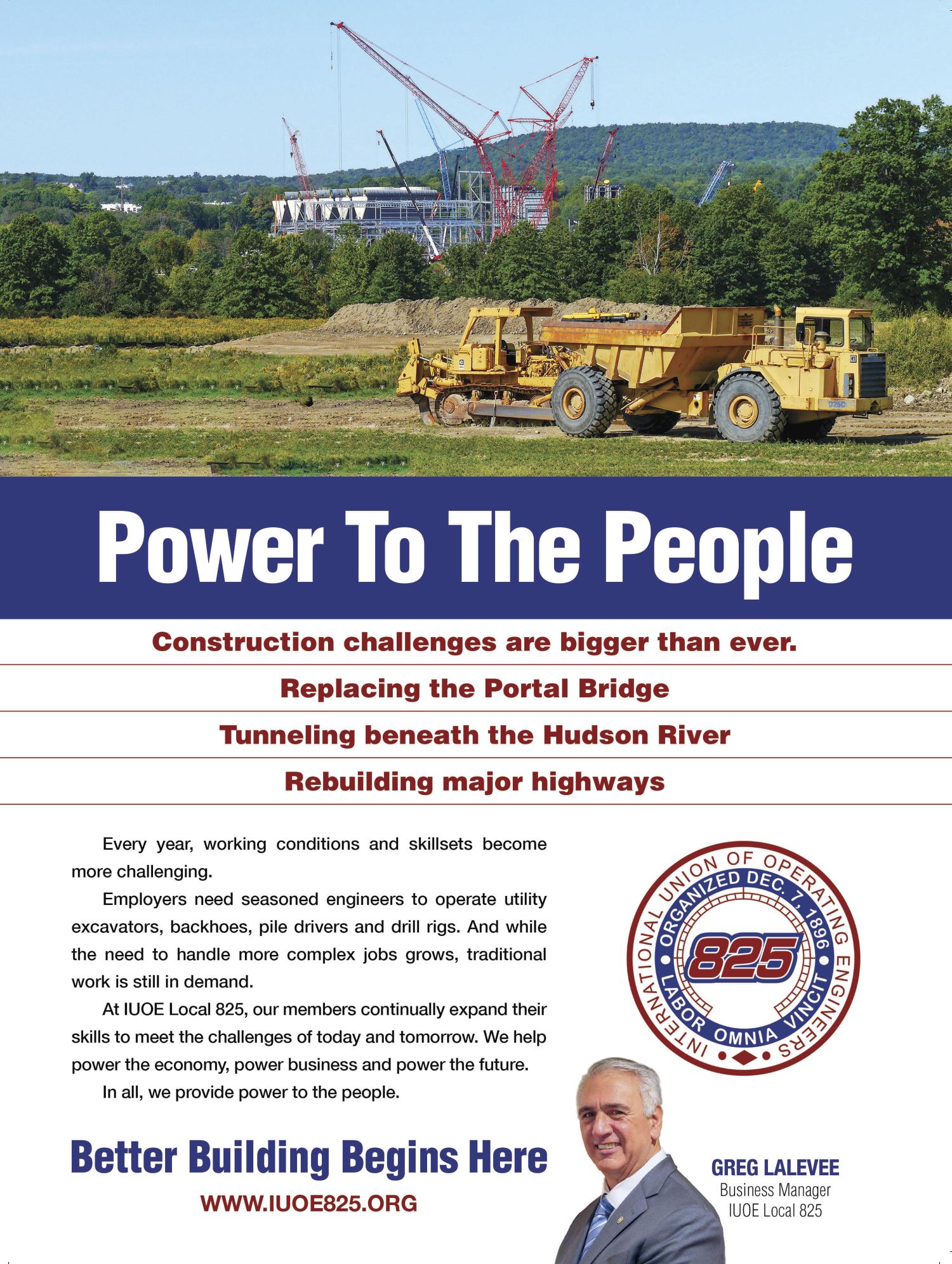





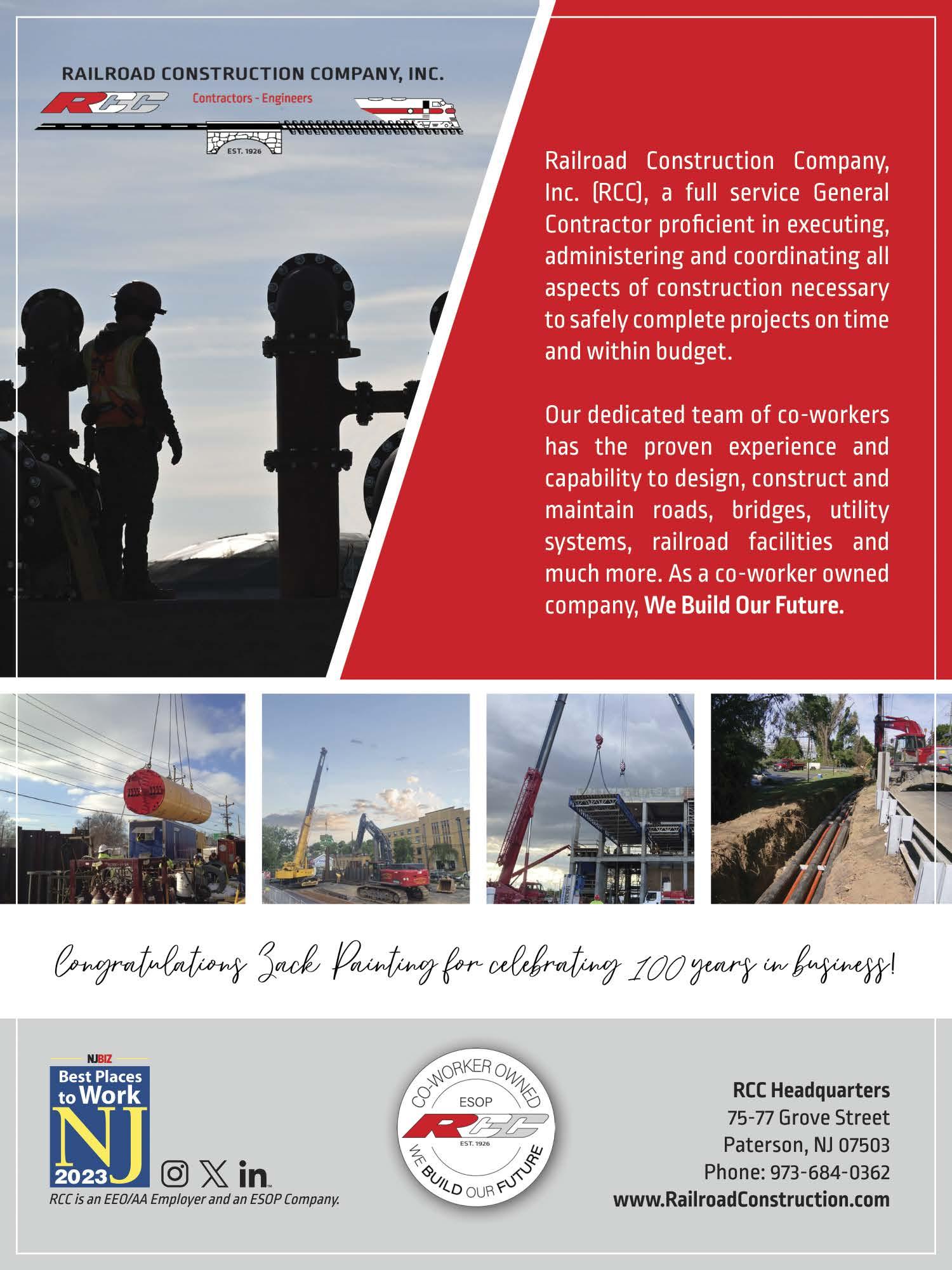

Cover Story
zack painting celebrates 100 years of excellence in services that go far beyond painting
By: ryan sharpe, director of government affairs and communications
There’s an old saying that change is the only constant in life. Adapting to that change often is the key to success for an organization. That maxim certainly applies to the construction industry and is perfectly illustrated by Zack Painting Company whose ability to adapt to industry change while adhering to their core values has allowed Zack Painting to achieve incredible success for over a century.
In fact, Zack Painting has evolved from a one-person painting operation to include four divisions that offer a variety of services in the industrial, commercial, and wastewater and water treatment sectors. In addition to providing state-of-the-art interior and exterior painting services, Zack also performs lead abatement, sandblasting, concrete resurfacing, wallpapering, line striping, fireproofing and much more.
When Zack Painting was formed in 1923, Babe Ruth was swatting homers for the New York Yankees in the newly opened Yankee Stadium while President Calvin Coolidge oversaw the peri-

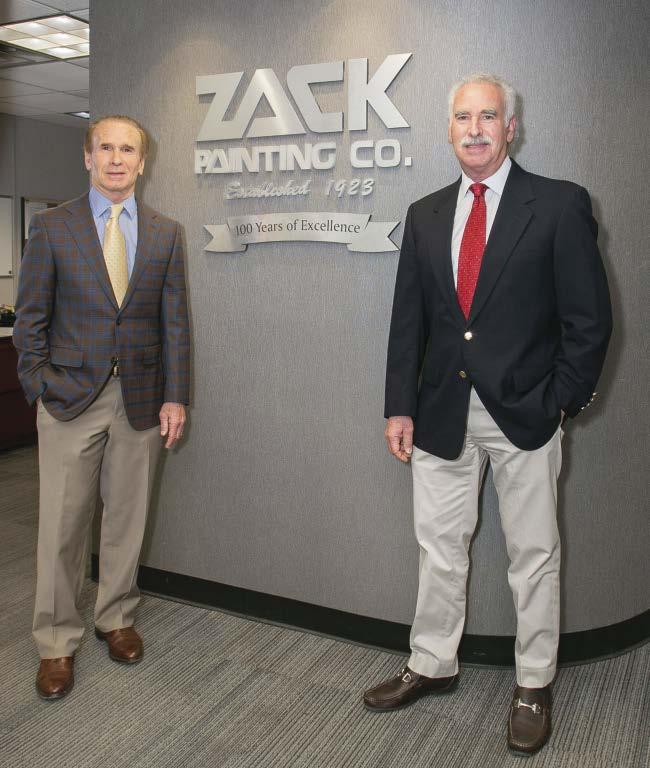
od of economic growth known as the “roaring twenties”. It was during this time, that Phillip H. Zack left his father’s painting business to open his own paint store and began a one-man painting business in Fords, NJ.
Despite some bumps in the road, the business flourished, securing its first major contract with Howard Johnson’s in New Brunswick. After World War II, Phil’s son Will helped the company expand its offerings to include industrial services and eventually took over the growing firm following the passing of Phil in 1962. Soon Will was joined in the business by his brother Jules who used the business acumen he acquired at Hess Oil to take Zack Painting to new heights.
By the 1970’s, Will’s son David traded in his job at a ski shop for a career at the company his grandfather started and was soon joined by his brother, Robert. Together, they co-own Zack Painting and they take great pride in the fact that David’s daughter, Leslie and Robert’s son, Michael represent the fourth generation of Zack’s working at the company.
While any company remaining within the same family for four generations is a rare occurrence, Zack Painting is even more unique for a number of reasons. As David and Robert attest, having siblings as 50-50 partners in a business for decades can be a challenge but they make it work by keeping their egos in check and not letting their differences affect their relationship.
“Even when we have a rare difference of opinion,” says Robert, “at the end of the day, we give each other a hug and head home.”
That continuity as a local, family-owned business is one of many factors that helps Zack stand out in a competitive industry. They note that while many companies have merged and been taken over by large, international corporations, they remain local
Utility & Transportation Contractor | february | 2024 42
Pictured left to right are Gary Pohl, Robert Zack, Michael Zack, Leslie Herman, David Zack and Adam Hileman.
Pictured from left to right are David Zack and Robert Zack.
which keeps them to close to their clients and to their projects. This proximity allows for a “hands-on” approach in which the contractor or owner deals directly with the project manager for the duration of the job.
In addition to forming solid relationships in the industry, being local also allows them to provide superior service by being available and at the job site where they can deal with any eventuality. Another benefit is that Zack Painting self-performs nearly all of their own work which lets them control all aspects of a project, from start to finish.
There are many other factors that make Zack uniquely positioned to assist their clients. One is the company’s expertise that they have acquired in the more than 100 years in operation. As they note, the current team collectively possesses hundreds of years of experience. In addition, they possess an extensive list of licenses and certifications to perform varied types of work throughout New Jersey, New York, and Pennsylvania.
They are also trained in various manufacturer specifications and employ cutting edge software to ensure they meet the highest level of quality in both product and application. In addition, they utilize their vast experience and training to adhere to the most rigorous industry standards, noting that they are certified by the Association of Materials Protection and Performance.
All of these factors help Zack Painting provide tremendous value and what they call “ease of use” for contractors who utilize their services.
In addition to their unequaled experience, another strength of the company is its ability to adapt to changes in the industry. While it began as a painting business, Zack Painting soon expanded into industrial services for what was once a thriving industrial hub in the Northeast.
As the industrial operations slowly left the area, Zack Painting added more commercial operations to its portfolio, performing work for a number of retail giants of the past and present, including Bamberger’s, Bloomingdale’s, Wal-Mart, Lowes, and Home Depot, to name a few. At the same time, while they continued to expand their commercial work, they also focused on diversifying their service offerings, which grew to include wastewater and stormwater projects as well as fire protection services for structural steel.
sure. They note with pride that they entered the tunnel at 4pm on Friday and were done by 4am on Sunday.
Another project with stringent deadlines was undertaken for the Southeastern Pennsylvania Transit Authority (SEPTA) in Philadelphia. By working round-the clock-shifts, they completed a track project one day ahead of their 28-day deadline. Another unique challenge they successfully confronted was a Hudson River pier project in which they could only work in four-hour shifts which were dictated by the river’s tides.
In addition to the numerous projects for water companies, authorities and pharmaceutical firms, other notable projects that Zack Painting has worked on include Red Bull Stadium, the Staten Island Lighthouse, and Newark Airport’s Terminal C.
Another area of focus that has helped Zack Painting achieve such remarkable long-term success is their commitment to safety, which they consider a core value of the company. This commitment to safety is seen in the extensive safety training offered to their employees, which includes semi-annual safety events and constant training in Confined Space, Telescoping Aerial Lift, Fall Prevention, and many other areas.
They have a full-time Environmental Health and Safety (EHS) manager on staff and also utilize third parties to provide safety
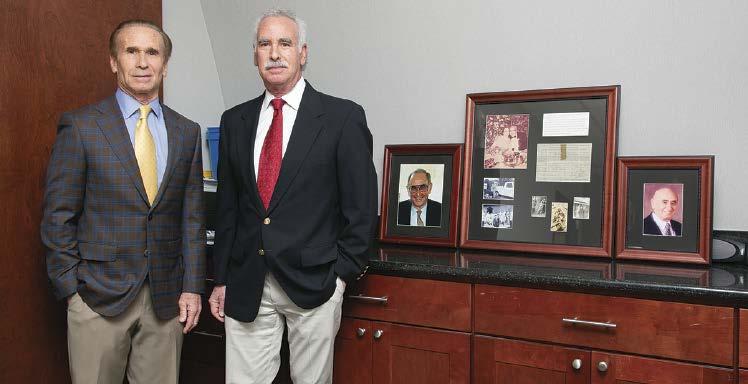
services. Their stellar safety record is reflected in their low Experience Modification Rating (EMR) which uses a company’s safety record to set workers’ compensation insurance rates.
One of the main reasons they cite for their years of remarkable success is their ability to tackle challenging and complex projects. “We like the difficult jobs,” says Robert who says their versality lets them take on unique challenges, especially projects that impose strict deadlines. Being able to meet these deadlines helps projects stay on time and limits downtime for vital infrastructure, like rail and tunnel operations.
For instance, they were able to complete a Jersey City Path Station project in less than the 54 hours allotted for a weekend clo-
An additional area in which Zack Painting utilizes their expertise and extensive training is their lead abatement services. These projects can involve erecting containment on the site and often require the use of personal protective equipment (PPE), including respirators and medical surveillance in which the staff undergoes blood testing during and after the project to ensure they are not exposed to the harmful effects of lead. Zack Painting’s lead abatement certifications and their unmatched experience have been utilized to alleviate lead issues on structural steel projects
Utility & Transportation Contractor | february| 2024 43 Cover Story
Pictured left to right are David Zack and Robert Zack.
Cover Story
and in schools, hospitals, and manufacturing plants throughout the tri-state area.
The team at Zack Painting also takes pride in the longevity of their staff which averages more than 20 years with the company and can swell to over 125 team members in the office and the field. They even had one employee who was with the company for 70 years.
They also credit their success to their relationship with their unionized staff who is affiliated with the International Union of Painters and Allied Trades (IUPAT) as well as the Bricklayers and Allied Craftworkers (BAC) Union. They are particularly proud of their high union retainage rate, which they believe is a result of treating their employees well and providing them with extensive training.
“As a family-owned company, the Zack’s have made sure that each and every employee feels part of the family,” says Adam Hileman, Industrial Operations Director. “Our dedication to training and certifying all field staff is top notch with semi-annual conferences
and events that have become a fun gathering for our field. David and Robert are always present and sure to greet every employee that walks through the door.”
Zack Painting is also an active member of the UTCA and has exhibited at the Annual Convention, sponsored the Scholarship Golf Outing, participated in the Clay Shoots, and attended various additional UTCA events.
The world has changed a lot in 100 years and Zack Painting’s ability to adapt to the changes and offer the diverse and vital services required in an evolving marketplace has allowed them to achieve unparalleled success. At the same time, they have embraced their long history of building relationships while offering value and superior performance.
These factors combined have helped Zack Painting thrive for the past century and have them poised to continue to grow and build on their incredible accomplishments for another 100 years. Congratulations to Zack Painting on achieving this milestone and we look forward to your continued success.
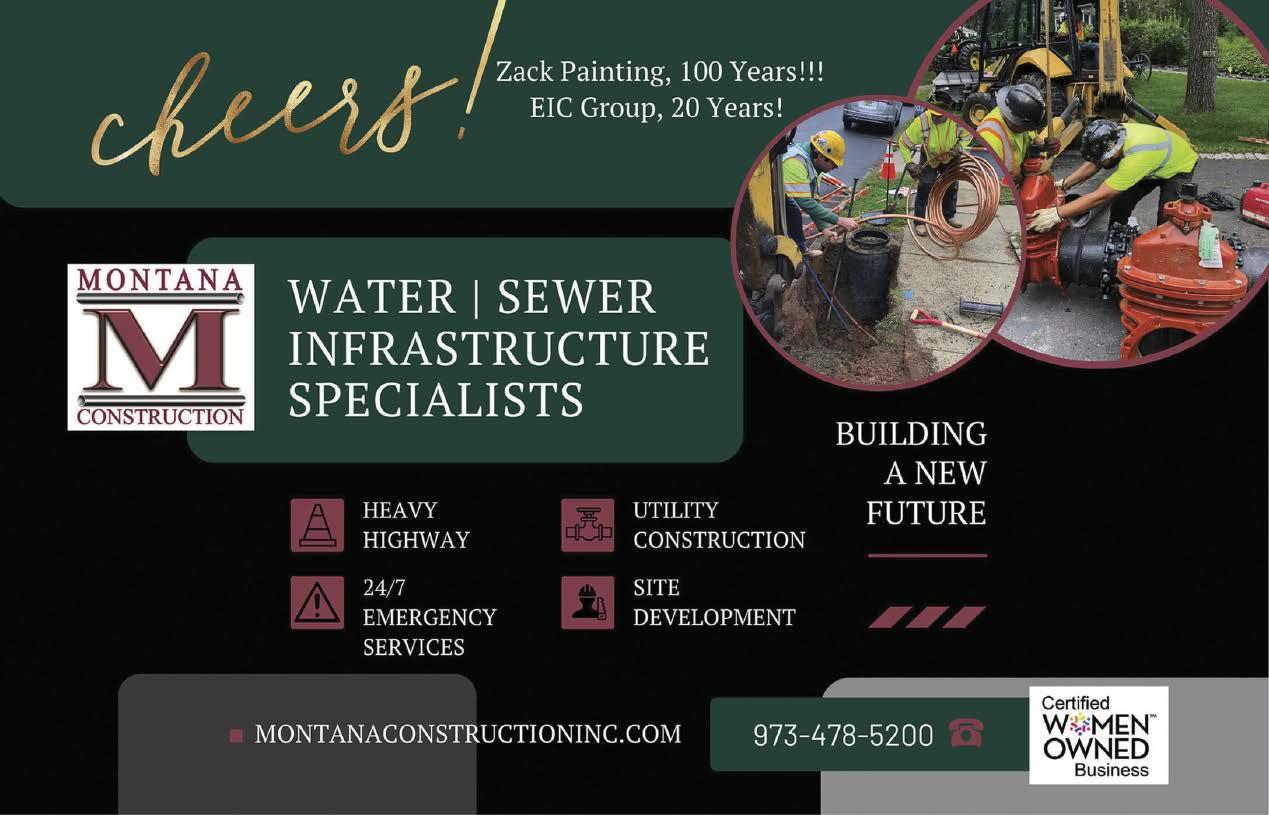
Utility & Transportation Contractor | february | 2024 44
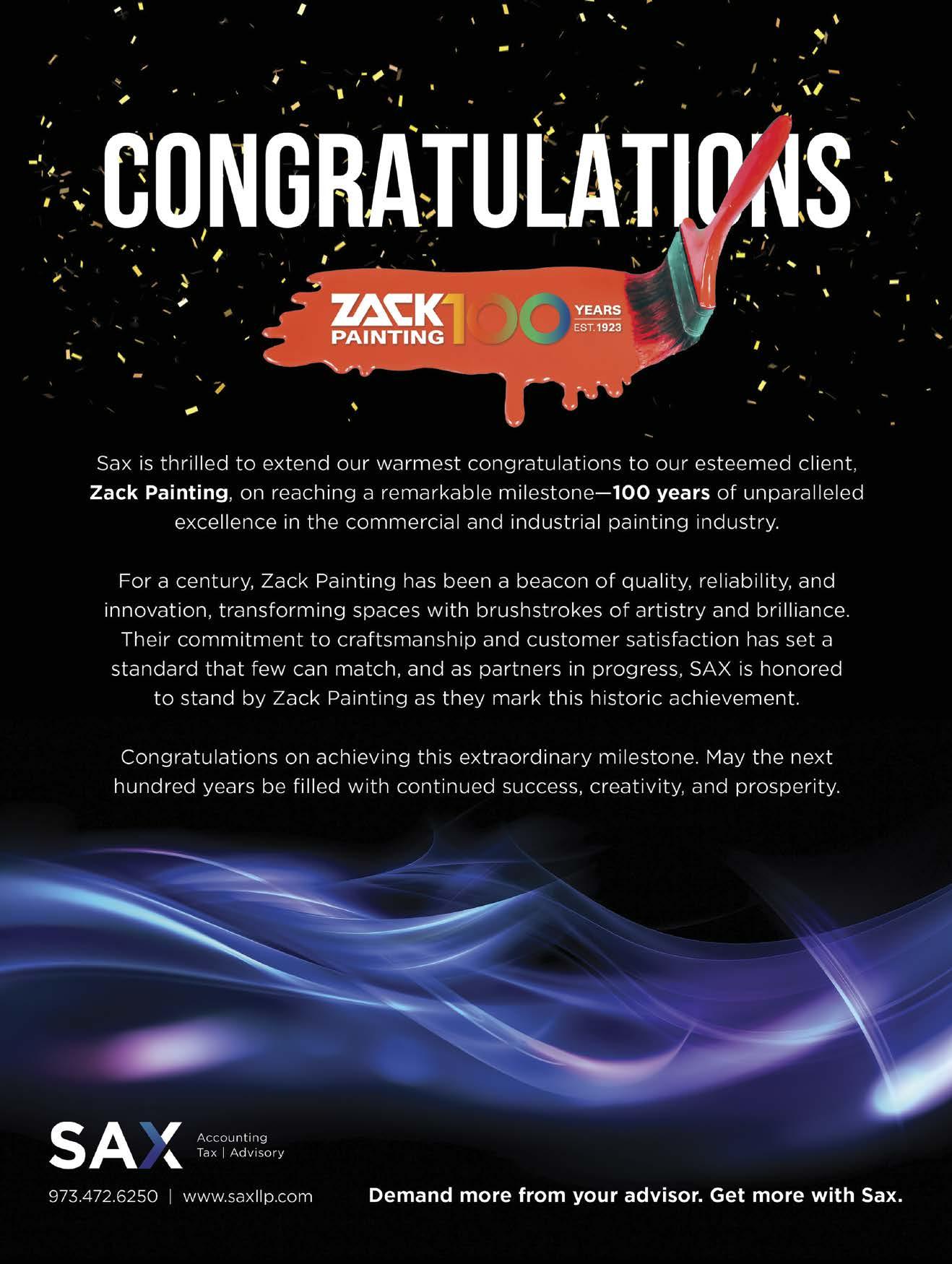
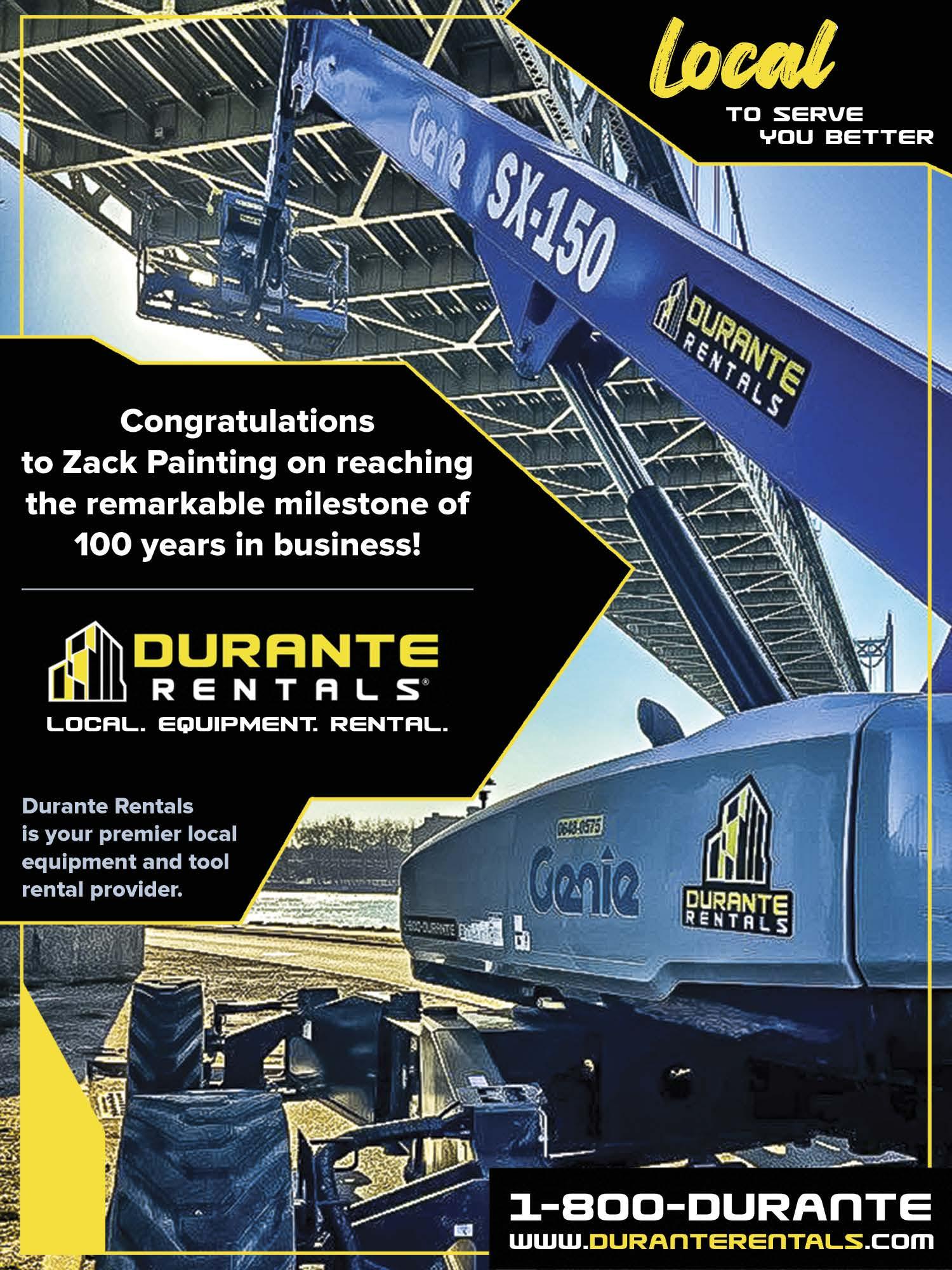



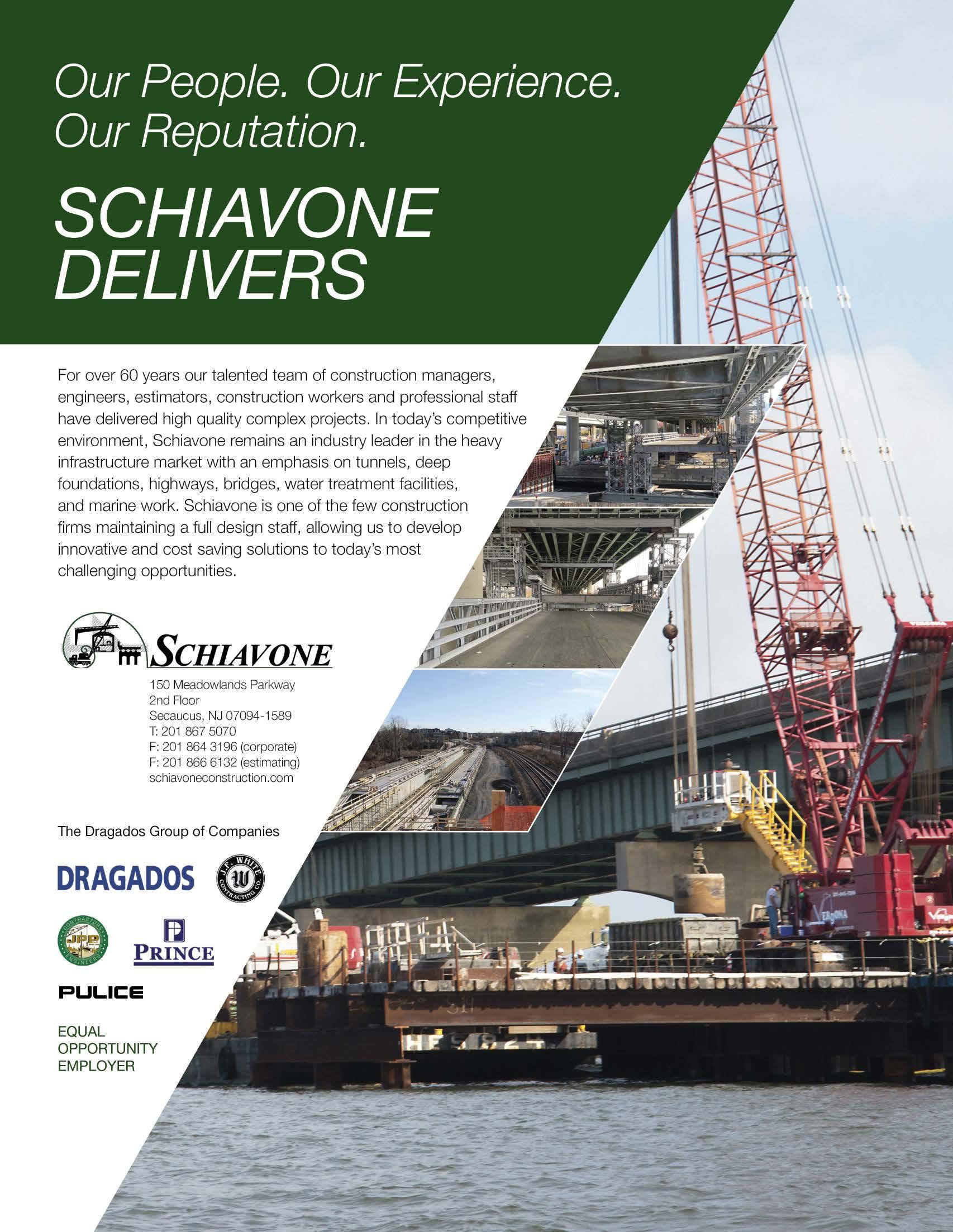
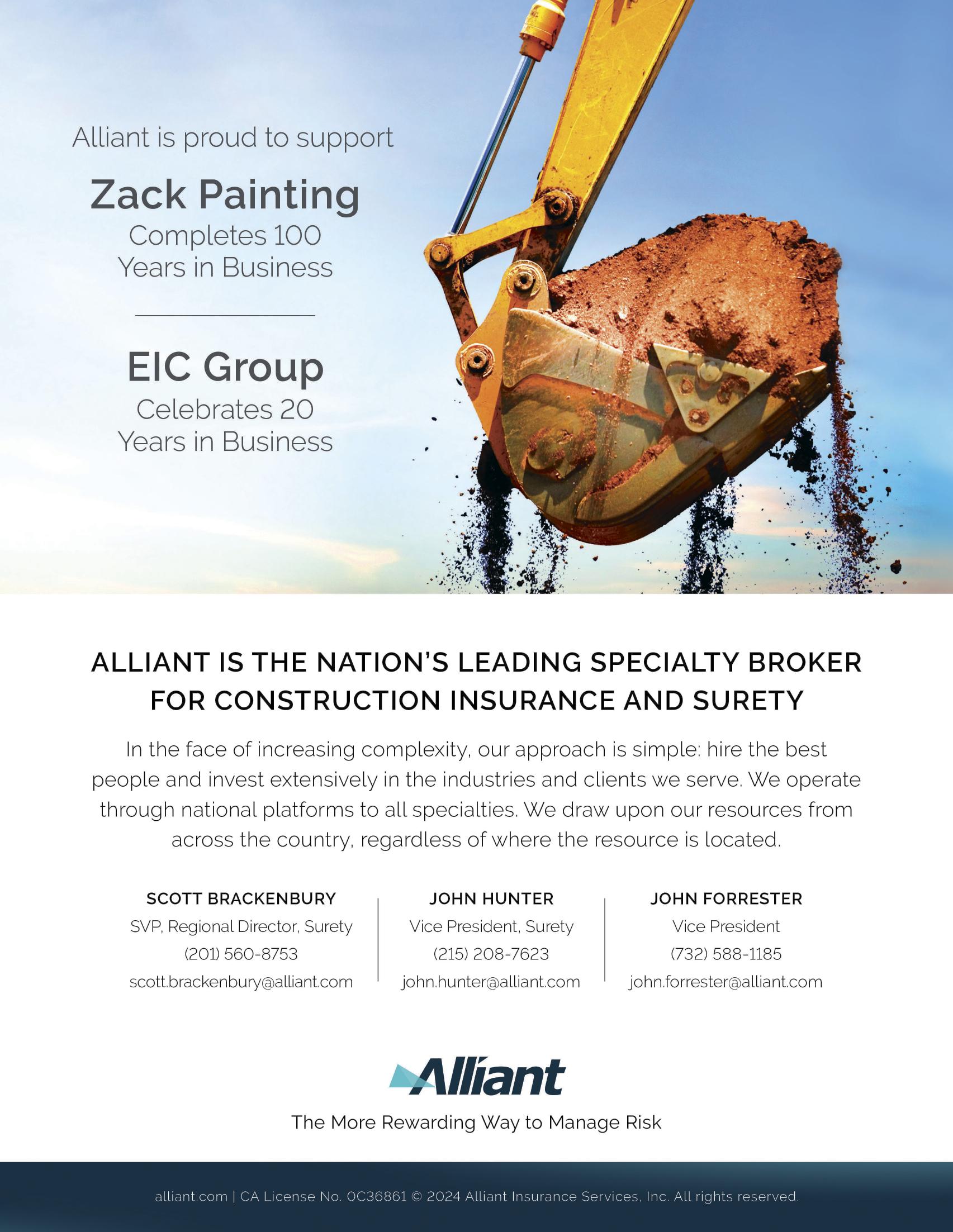




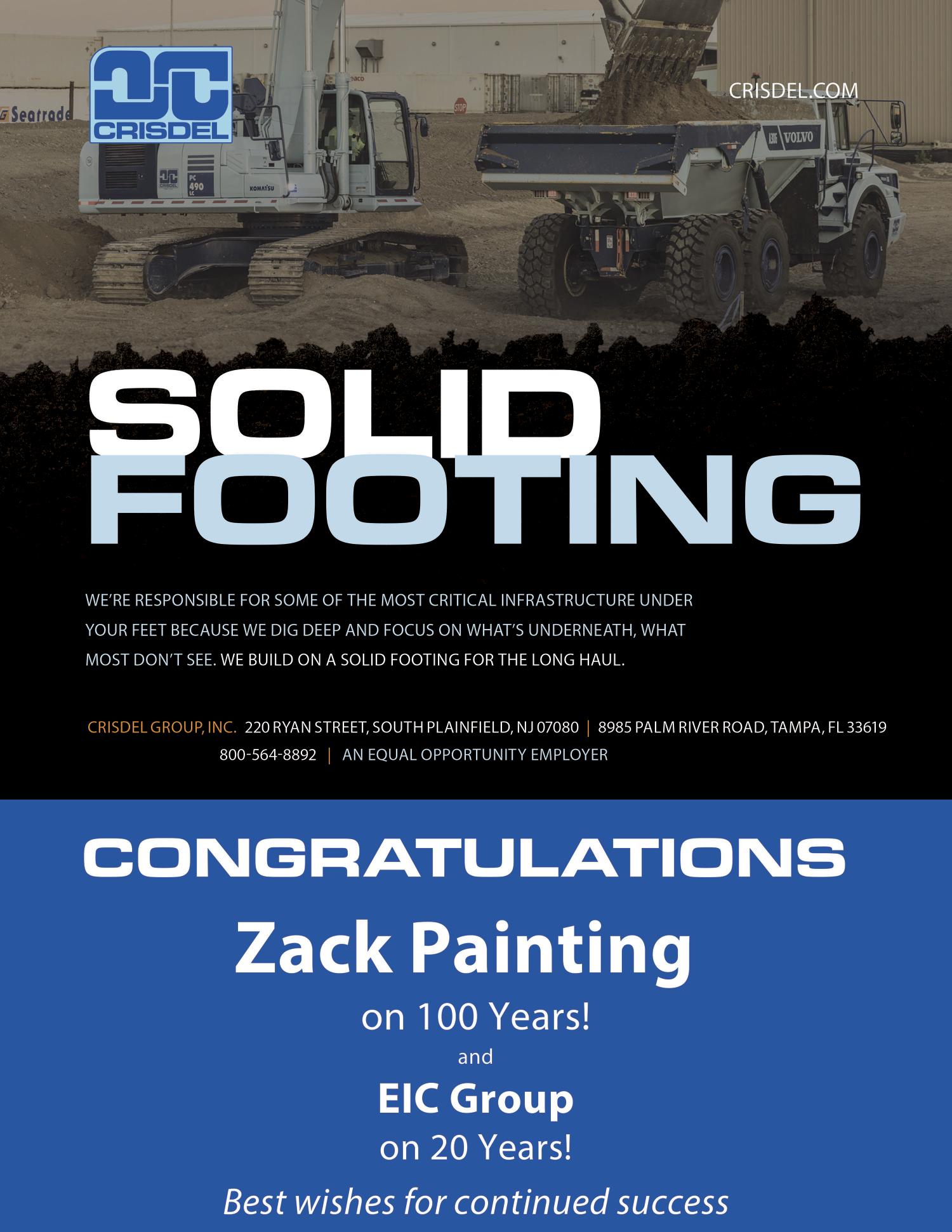

the njdol is increasing enforcement of misclassifation rules in 2024, with a focus on trucking companies
By: othiamba n. lovelace, esq., tobia & lovelace
Our clients in the transportation industry know the importance of properly classifying their drivers as either “employees” or “contractors.” In the past, they have faced lawsuits by drivers who have alleged that they were misclassified as independent contractors. Now, the New Jersey Department of Labor (“the NJDOL”) has a new and more powerful tool it can use against trucking contractors who allegedly misclassify their drivers.
In 2021, Governor Murphy signed a law that allows the NJDOL to start a lawsuit in the New Jersey Superior Court against companies, including truckers, who misclassify their drivers as independent contractors rather than as employees. On December 11, 2023, the NJDOL filed its first lawsuit under this new law.
The NJDOL’s action against two trucking companies alleges that the companies misclassified hundreds of drivers as independent contractors who should have been classified as employees. The NJDOL further alleges that the companies deprived these drivers of their wages and other rights, and that the Unemployment Compensation Fund and State Disability Benefits Fund also incurred damages.
In addition to seeking an injunction, the NJDOL has sought millions in back wages for the drivers, penalties, fines, and attorneys’ fees. Perhaps more chilling, NJDOL’s Complaint also leaves open the possibility of adding claims against individual owners, officers, directors, shareholders and/or other representatives of the companies. It is noteworthy that the Complaint mentions that there had been a prior investigation into the misclassification, and a failure to respond to the NJDOL’s request for documents. There is also an allegation that the defendants failed to maintain records of hours worked and wages paid to the drivers.
From a legal perspective, the applicable “ABC test” presumes that a worker is an employee: A) until an employer shows that the worker’s performance is free from the employer’s control; B) the work done by the worker is outside the employer’s usual course of business or is performed outside of its place of business; and C) the worker is part of an independent trade or profession. (E. Bay Drywall, LLC v Dept. of Labor and Workforce Dev., 251 NJ 477, 495, 278 A3d 783, 793 [2022].)
The employer’s “control” over a worker becomes a factual issue that often pervades disputes concerning misclassification. For example, in this recent case, the NJDOL alleges that the com-
panies exercised control over the drivers by: 1) requiring their names to appear on the drivers’ trucks; 2) requiring the drivers to lease their trucks to the defendants for the latter’s exclusive use; 3) prohibiting the drivers to use the trucks for other work without the defendants’ written consent; and 4) controlling the drivers’ assignment routes and rates of pay.
It’s clear that this recent NJDOL case has huge implications for all employers, and for the trucking industry, especially if the NJDOL prevails. In the meantime, the lawsuit demonstrates that it is imperative to properly classify all workers. All companies must closely analyze all the relevant factors and seek assistance from an attorney if the company is unsure whether a worker can be safely classified as a contractor. At a minimum, they will need to maintain precise records of hours and be ready to cooperate in an audit or investigation by the NJDOL to potentially avoid a lawsuit in the first place.
In addition to the NJDOL’s increased scrutiny of worker classification in 2024, we expect that we’ll also see the NJDOL’s continued enforcement efforts through its stop-work orders. As of December 2023, the NJDOL had issued 147 stop-work orders since the department gained the expanded power in 2019 to stop projects before a hearing is conducted. For example, as recently as November 29, 2023, the NJDOL’s Division of Wage and Hour and Contract Compliance issued a stop-work order immediately halting the construction of a building in New Jersey. The alleged violations were Failure to Pay Prevailing Wage; Records (Inaccurate Certified Payrolls); Certified payrolls not submitted to public body; Failure to Register; and Unpaid Wages/Late Payment.
Stop-work orders are a powerful tool that the NJDOL has and will continue to use. Contractors that fail to abide by all applicable regulations on prevailing wage jobs should be prepared for these types of consequences. This can result in the contractor paying massive fines to the State, plus massive fines if they are unable to complete their projects on time due to the stop work notice.
This new year has also ushered in additional requirements that all companies must implement. One such change concerns minimum wages. Starting on January 1, 2024, New Jersey’s minimum wage increased to $15.13 per hour. Some employers, such as seasonal employers and businesses with six or fewer employees, are given more time under the law to reach the minimum wage. Employers that do not follow the new law will face sanctions.
Utility & Transportation Contractor | february| 2024 57 Labor Relations
Finally, another change in 2024 requires all companies to start filing their certified payroll online in August of this year. Paper submissions are being phased out. This will make it easier for companies to comply with their reporting requirements, but it will also make it easier for the NJDOL to track companies that are in noncompliance.
If you have any questions about the topics raised in this article, or about any other labor relations matter, please do not hesitate to contact the attorneys at Tobia & Lovelace Esq., LLC at 973-7466000 for further information.
About the author...Othiamba (“O.T.”) N. Lovelace is a partner at the law firm of Tobia & Lovelace, Esqs., LLC. His practice focuses on commercial litigation, ERISA related disputes, withdrawal liability claims, collective bargaining agreement negotiations, disputes arising out of alleged violations of union collective bargaining agreements, litigating disputes before the National Labor Relations Board (“NLRB”), defending companies charged with safety violations by the Occupational Safety and Health Administration (“OSHA”), counseling companies during hostile union elections, New Jersey prevailing wage claims and disputes resulting from federal and state contract compliance audits.


Utility & Transportation Contractor | february | 2024 58
Labor Relations
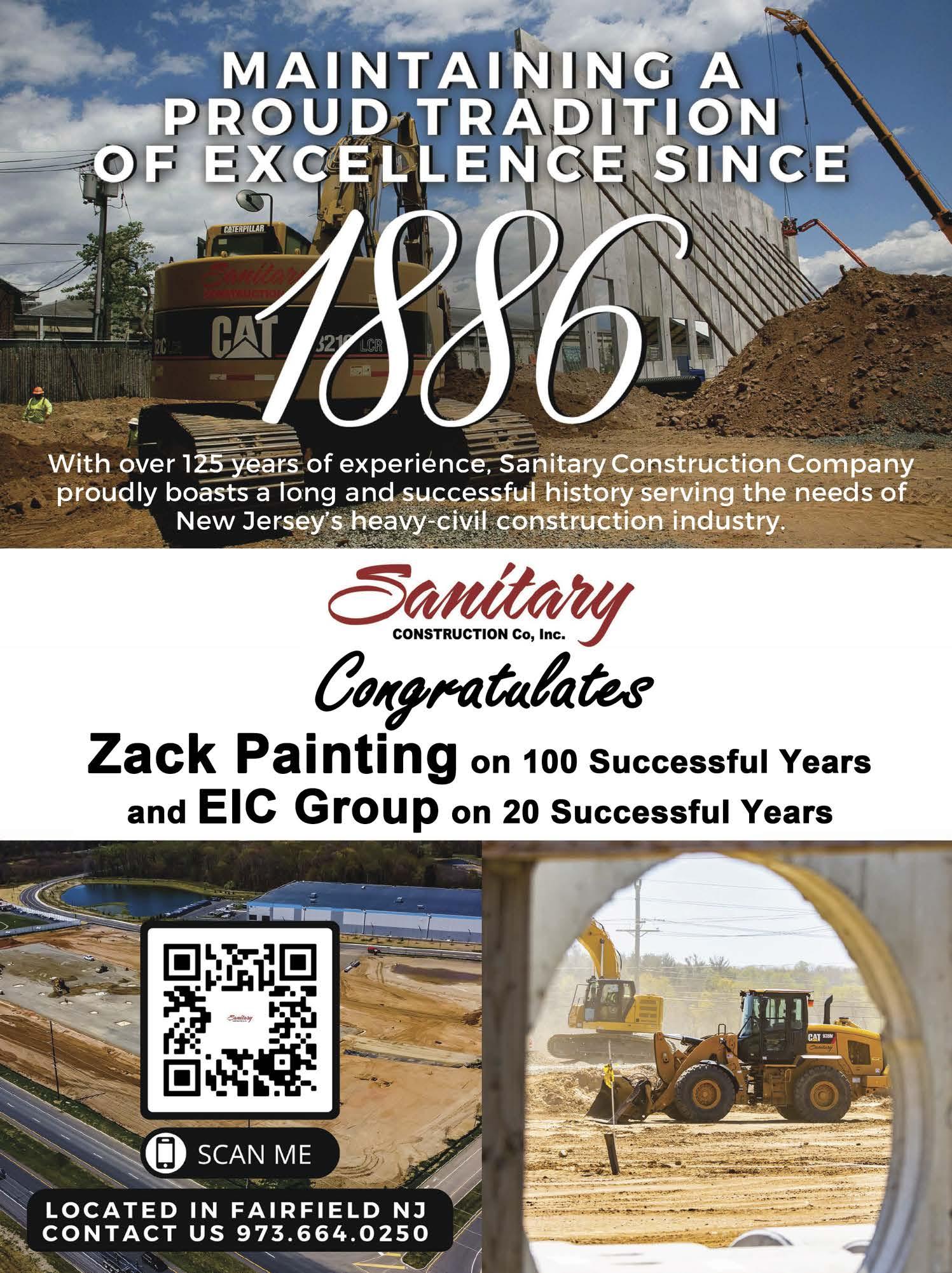


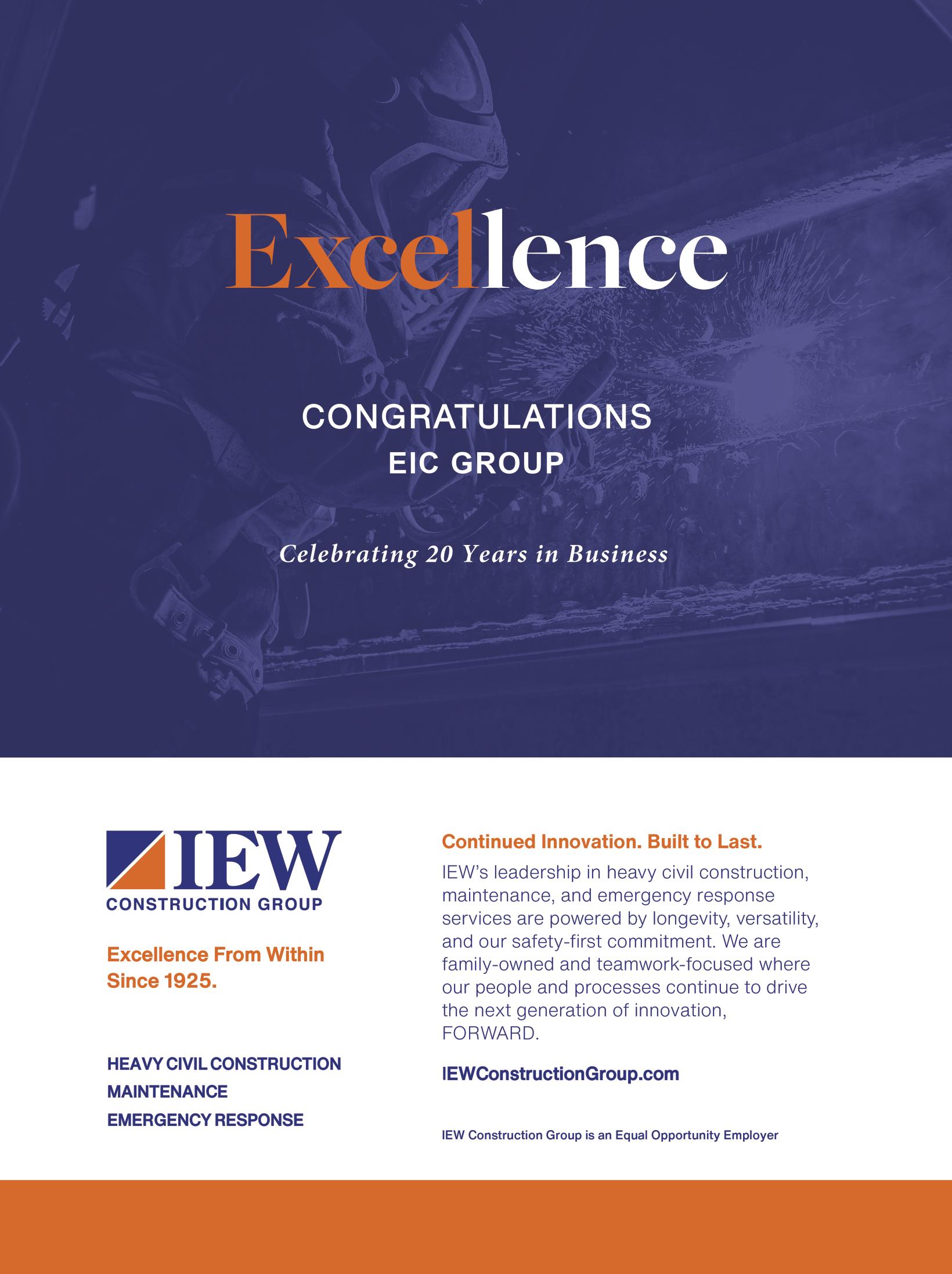
EIC Group LLC Celebrates Twenty Years in Business as One-Stop Shop for Construction Engineering
By: Ryan Sharpe, Director of Government Affairs
After working together at an ENR top 500 engineering firm for several years, Michael Marks, David Newkirk, and James Gow elected to take a risk, follow their passions, and utilize their combined experience in the construction industry to found EIC Group, LLC in 2004. Their gamble has paid off as EIC Group has become a highly successful company, providing bridge and civil engineering, land surveying, and contractor support services primarily in the tri-state area. The company has maintained its focus of providing these services aimed at the heavy highway, government, commercial and residential markets over the last two decades.
With a combined 60 years of engineering experience, Marks, Newkirk, and Gow soon found their services in high demand. They realized there was a growing need for construction engineering, and they began to focus on providing services for contractors. Their extensive experience, unique knowledge and relationships in the industry have made them uniquely suited to helping their clients succeed in a very competitive field.


but small enough to ensure they are responsive to clients, while also remaining affordable. They take great pride in the fact that a contractor is always able to get in touch with an engineer or even an owner.
But there are many factors that have driven this sustained run of success. The EIC team points to the size of the 20-person firm as one that is big enough to tackle large and complex projects
In addition, EIC’s extensive experience working with state agencies is a tremendous asset to clients who perform government projects. Moreover, with expertise in permanent bridge design and various engineering specialties, they are equipped to provide services on a wide variety of projects. In fact, the diverse assortment of services they offer allows them to assist contractors in every step, from bidding to completion of a project. Their experience helps the client tackle challenges with an already-designed project, noting that they can clarify design specifications and facilitate construction. Additionally, due to EIC’s extensive permanent bridge design experience, they are often brought in when a design element may need to be changed. EIC has national experience that can be very beneficial to their clients. This includes membership on the AASHTO Steel Bridge Erection Guide Specification Committee, serving as a team member for the redesign of the I-35W bridge over the Mississippi River after its collapse in 2007, and the Engineer of Record for the Rehabilitation of the Sorlie Bridge over the Red River in Grand Forks, North Dakota. When a client is interacting with a project owner, the contractor is able to utilize the expertise and credibility that EIC has earned during their many years in engineering.
Utility & Transportation Contractor | february| 2024 63 Feature Story
New Jersey Turnpike Authority Contract P100.579 - Support of Excavation.
Pennsylvania Department of Transportation, Approach Ramps to the Betsy Ross Bridge - Setting Ramp D over Conrail using custom designed truss spreader beam.
What also sets them apart is their contractor-driven design process which gives the contractor the opportunity and ability to offer input on the construction engineering design as it progresses. This results in a buildable, cost-effective solution, ultimately increasing efficiency. Moreover, they engage with the contractor throughout the life of the project which can start before a project is bid offering many types of services required for varying stages of a project including technical support at bid, value engineering solutions, surveying, traffic control plans and all types of construction engineering. Thus, they offer a “one-stop shop” of engineering services which is efficient and cost effective for contractors.
The decision to specialize in construction engineering has proved quite successful as EIC has become the “go-to” engineer for a vast array of contractors, many of whom use the firm for all their projects. They are understandably proud that nearly all of their work comes in the form of repeat business, in addition to referrals from existing clients.
EIC Group serves some of the most successful heavy highway steel erectors and contractors primarily in New Jersey, New York, Pennsylvania, and Connecticut. However, EIC has provided construction engineering services for many large projects across the United States including in the Midwest, Florida, and Puerto Rico.
A small sampling of some of these projects include all the erection engineering for the challenging I-95 and Betsy Ross Bridge Interchange Reconstruction in Philadelphia, construction engineering including the design of complex temporary superstructure supports for the Pulaski Skyway Bridge Repairs, and construction engineering including the temporary strongback design, and the temporary bridge abutments and launch procedures for the Rt. 22 Bridge over Chestnut Street in Union.

staff works collaboratively, including the company owners, in order to provide the optimum solution to the client. The staff also note the personal relationships and the ever-changing challenges
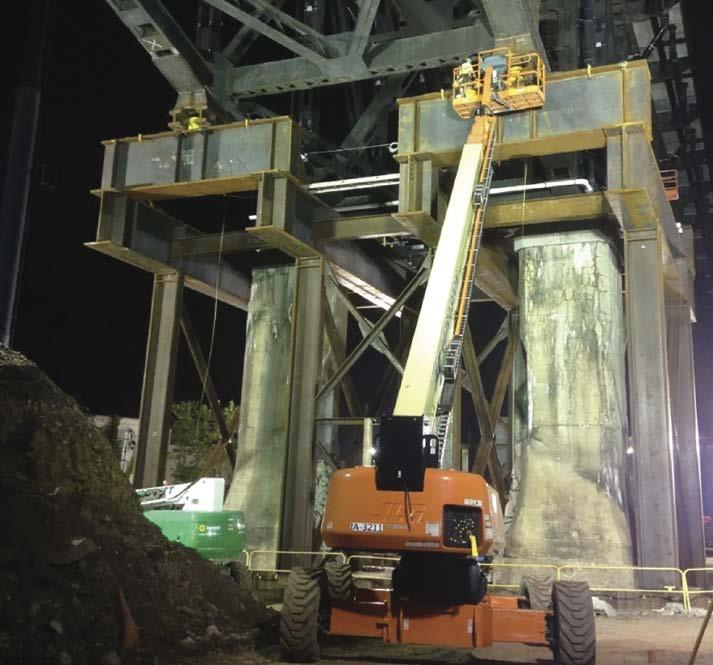
of the work as distinct advantages to a career at EIC. Many staff members mention how rewarding it is for them to see a project through to completion, which is not always possible at larger firms.
Two of the Senior Project Engineers at the firm agree the work atmosphere is one of the benefits of working at EIC. In fact, José Arismendi points out that he appreciated the unique work environment during his first interview.
“I could feel the difference right away,” he says. “The way we interact with our colleagues--and the company owners—creates a family atmosphere I have found to be incredibly rewarding.”
Another Senior Project Engineer, Victoria Rotberg cites the types of work she performs as adding to the positive work environment.
“At EIC we have the opportunity to work on diverse projects which gives us valuable experience in many facets of engineering,” she said. “Every day is different and, while the work can be challenging, it is never boring.”
The leadership of EIC also points to their positive work environment as a key to their success. At their office in Fairfield, staff members work on a variety of engineering tasks and are exposed to many different aspects of construction engineering. All of the
Both José and Victoria also appreciate the opportunity to grow with the company and say they would encourage young engineers to consider a company’s work environment when deciding where they want to work.
Utility & Transportation Contractor | february | 2024 64 Feature Story
New Jersey Department of Transportation Pulaski Skyway Contract 5 Temporary Superstructure Support at Piers 76 and 77.
New Jersey Department of Transportation, Route 22 over Chestnut Street
Temporary strongback and Pier to support a portion of the existing two girder bridge during staged construction.
As much as the staff appreciates the company, it is clear they are deeply valued by the leadership of EIC. That appreciation is evidenced by the leadership transition currently underway in which three current senior staff members, Anthony Drozdowski, Sean Kennedy and Zeus Wu are in the process of purchasing the company with the founders assuming more of a technical role. The new owners have been with the firm almost from inception and have become well-known experts in the field. Marks says this internal transition meets the goals of the founders to see the company continue to grow under the leadership of individuals who have contributed greatly to the success of EIC Group through their loyalty, hard work, technical excellence, and dedication. They have dedicated the majority of their careers towards the advancement of EIC and have contributed significantly to what the company is today.
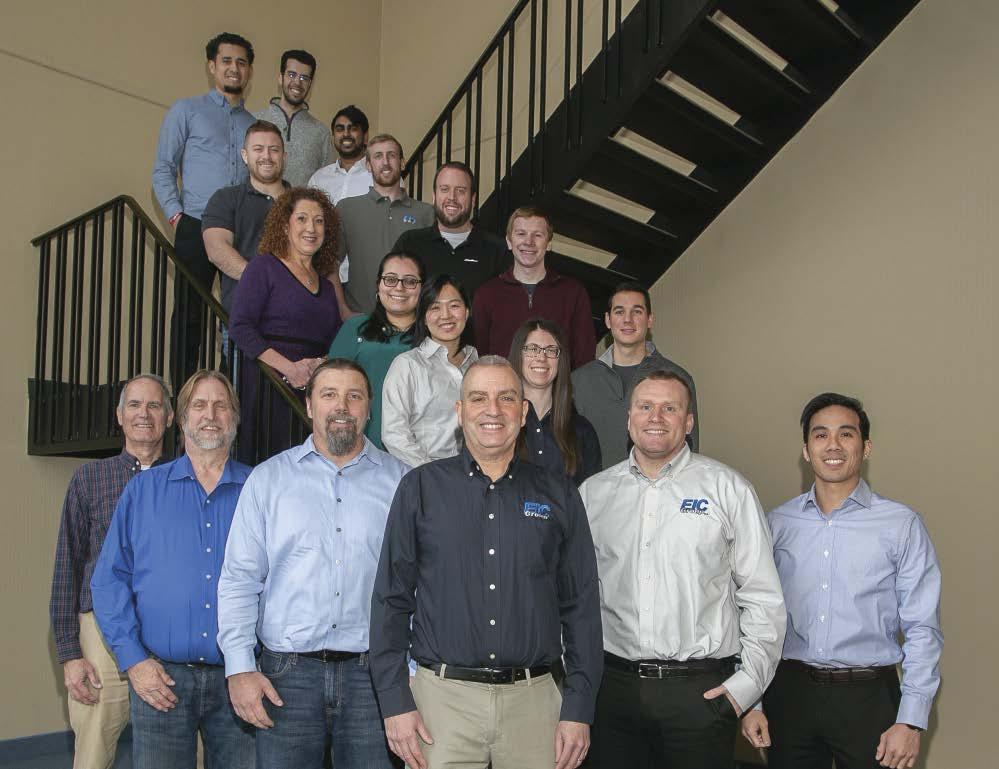
This transition to a new leadership team that has been involved with the company for several years will allow EIC to maintain its position as a leader in the construction industry and continue its steady growth long into the future.
Congratulations on two decades of excellence and we look forward to what the next 20 years will hold for EIC Group.
Not Present: Donna Morgan, Tuan Nguyen PE

Utility & Transportation Contractor | february| 2024 65 Feature Story
Lower row, left to right: David Newkirk PE, James Gow PLS, Anthony Drozdowski PE, Michael Marks PE, Sean Kennedy PE, Zeus Wu PE
Stairs top to bottom, left row: Jose Arismendi PE, Ben Podgurski, Jeri-Ann Ciampa, Heidi De Leon, Helen He PE, Victoria Rotberg PE
Stairs top to bottom, right row: Shawn Kuchmar, Gregory Sarjue, Daniel Gow, Nathan Seguin PE, Declan Mulroy, Dylan Walsh


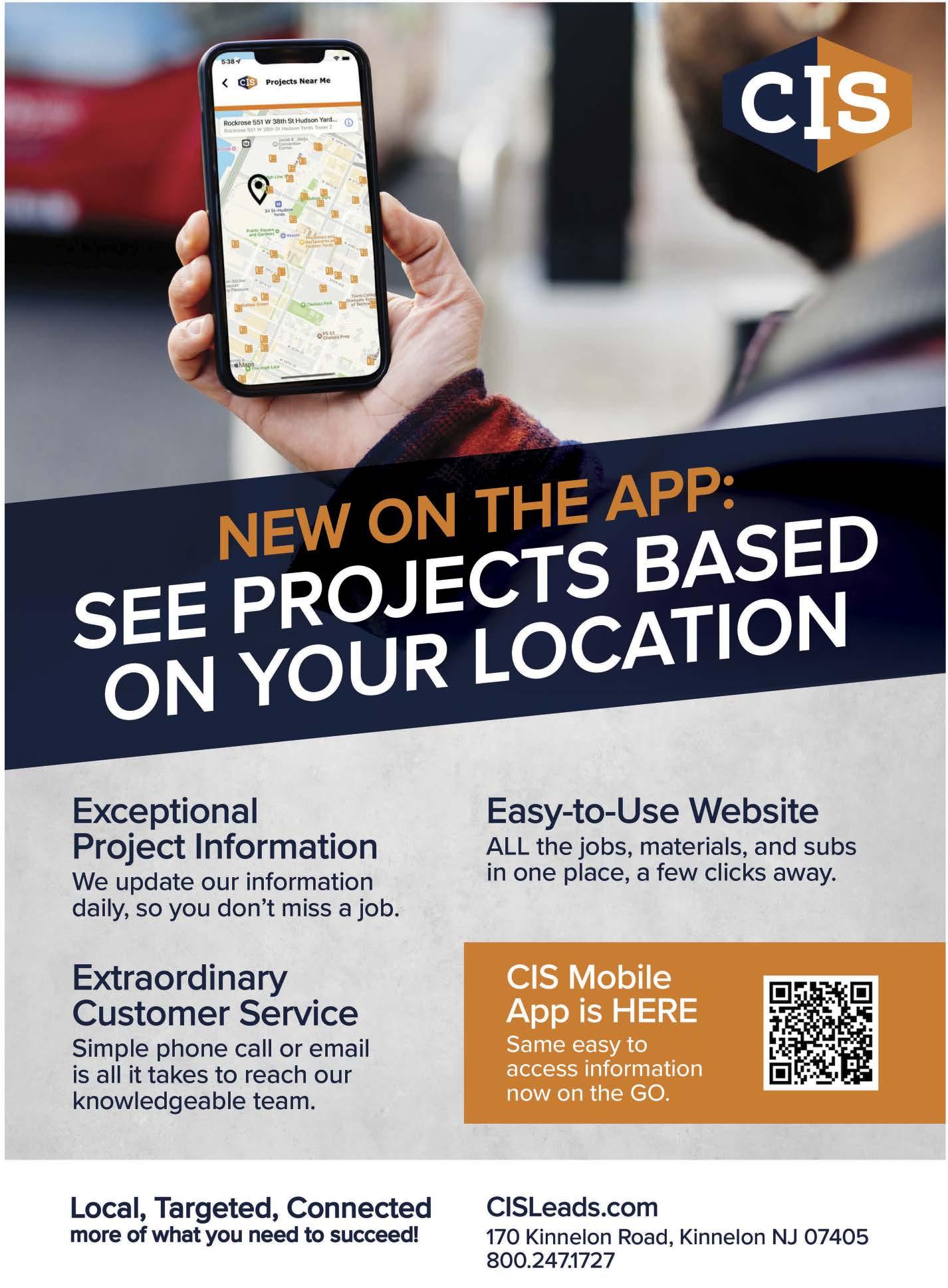


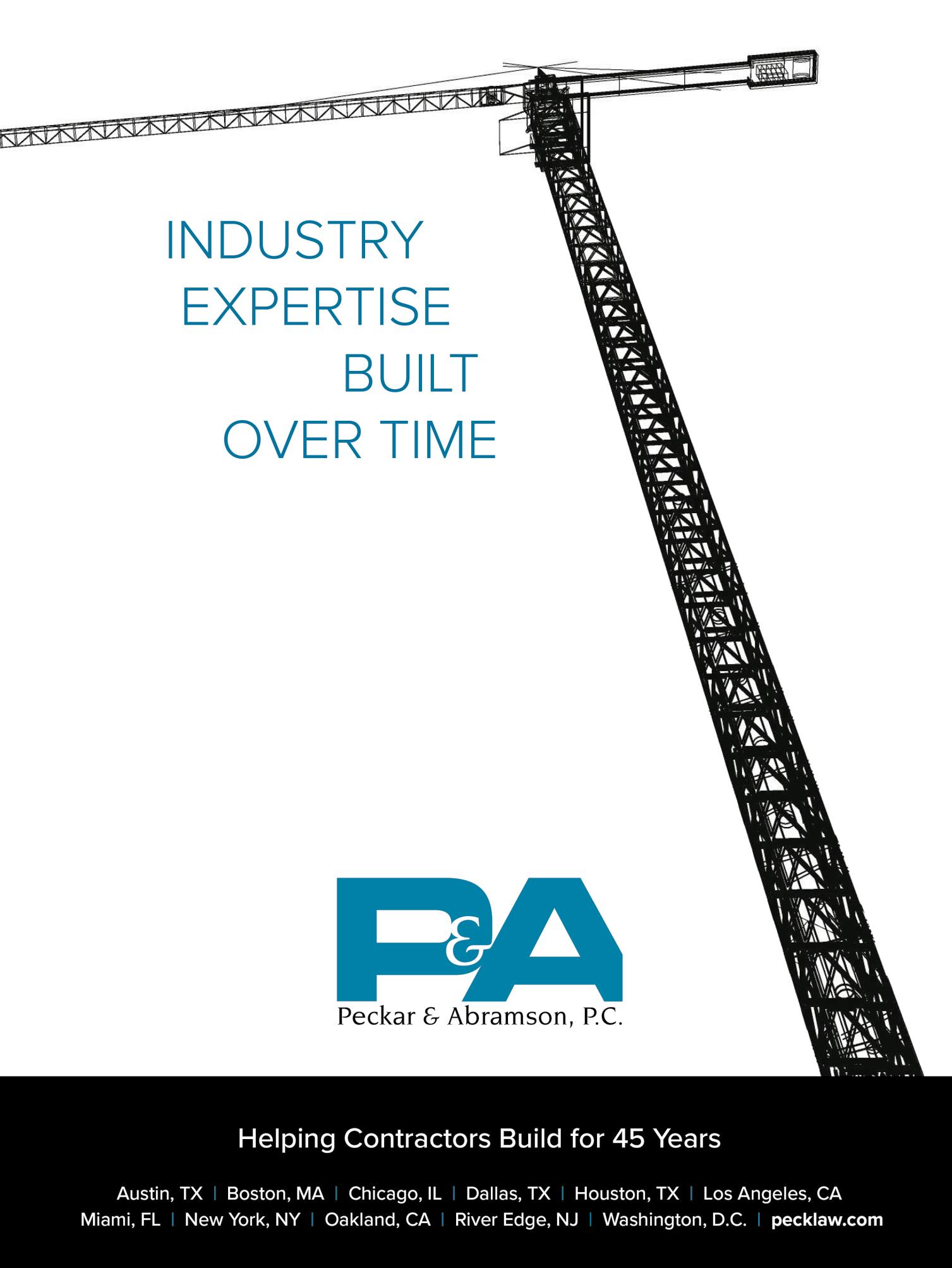

6 HR TRENDS to monitor in 2024
By: Margaret fitzgerald & karen walsh, ioa
In today’s market, HR professionals must adapt to the changing expectations of organizations and employees amid difficult economic conditions. As such, proactive HR leaders and professionals will approach 2024 with strategies that incorporate artificial intelligence (AI) into everyday operations, satisfy employee demands for greater compensation and flexibility, and conform to evolving compliance standards. Organizations will benefit from putting people first and responding to what their workers need.
To aid HR professionals in meeting organization and employee demands and desires, this article highlights six HR trends to pay attention to in 2024.
1. Artificial Intelligence / Technology
In 2023, AI exploded in popularity. Many employers adopted this technology to streamline operations, enhance workflows and improve customer experience. Looking forward, employers will increasingly leverage AI in workforce and organizational operations. As such, AI will likely play a greater role in helping employers and HR professionals make employment decisions, complete repetitive tasks, and evaluate organizational data. However, as AI becomes commonplace, employers will have to shift their focus to prioritize ethics and compliance-related issues associated with this technology. This will likely include addressing how data will be used with generative AI, who will use the technology, and how best to comply with changing laws and regulations. Furthermore, employers will continue to focus on issues of transparency, privacy and potential discrimination when using AI in 2024.
2. Skill Gaps and Skills-based Hiring
Going into 2024, employers are still struggling to find talent with the right skill sets. Although the most recent labor report by the U.S. Bureau of Labor Statistics found there were 6.3 million unemployed individuals, pervasive skill gaps continue to challenge employers looking to attract top talent. This year, employers may refocus their hiring efforts on finding employees with the right skills rather than specific experience or education. This concept, known as skills-based hiring, evaluates candidates based on their skills and capabilities rather than traditional qualifications, such as degrees or experience. Organizations that provide robust learning and development initiatives can consider hiring workers who are an excellent cultural fit and training them on specific skills or tasks later. By recognizing workers’ abilities to learn and develop, this hiring method allows organizations to find skilled
candidates for their open roles instead of trying to mold candidates to a set job profile.
3. New Compliance Rules
Recent compliance and regulatory actions will impact organizations in 2024. Many states have enacted new benefits laws regarding paid parental, medical and family leave, retirement plan options, sick time, and paid time off to vote. In 2023, the U.S. Department of Labor also proposed a new overtime rule, which is expected to address how to implement the exemption of executive, administrative and professional employees from the minimum wage and overtime requirements of the Fair Labor Standards Act (FLSA). It could also provide clarity for classifying exempt employees and increasing their salary levels under the FLSA. This rule is expected to take effect in 2024. Expanding pay transparency laws will also impact employers in 2024 and beyond. Data from the National Women’s Law Center revealed that more than 1 in 4 workers are currently covered by pay transparency laws. As more states and localities embrace pay transparency, more employers will likely be affected by these regulations. Navigating different pay transparency regulations can be challenging, especially for employers with employees in multiple states. Savvy employers will stay current with evolving state and local laws and take proactive measures to avoid potential litigation.
4. Return to Work
Employers are increasingly requiring employees to return to the office despite the widespread popularity of flexible work arrangements. According to a recent survey by ResumeBuilder, 9 in 10 organizations with office space will require employees to return to in-person work by 2024. This shift has been marked by increased scrutiny of workers and employee backlash at some organizations. Many employers worry that pressuring employees to return to the office could cause increased turnover or damage their reputation. In 2024, proactive employers will focus on balancing in-person requirements with employee expectations and desires.
5. Employee Engagement
Employee happiness and engagement have declined significantly since the beginning of the COVID-19 pandemic. A recent study by software company HR Bamboo found that employee happiness declined 6% from the start of 2020 to the present. In 2023, employee happiness dropped even quicker, with a decrease of 9% since January. Some HR experts have referred to the sharp de-
Utility & Transportation Contractor | february| 2024 73
NEWS
cline in employee engagement as “the Great Gloom.” This trend indicates a strong link between employee engagement and economic and societal conditions. Furthermore, high inflation has caused many organizations to adopt cost-cutting measures, such as layoffs or heavier workloads for employees, which can increase stress, decrease morale, and contribute to a negative workplace environment. In the next year, employers will increasingly focus on driving employee engagement. Savvy employers will recognize that employees’ needs and expectations shift with the economic climate and will adjust to meet evolving employee demands. These strategies may include a renewed focus on honest and transparent communication, psychological safety, fairness and belonging.
6. Competitive Compensation
Although the labor market has eased somewhat from previous years, employers predict attraction and retention challenges will persist into 2024. Many employers will respond with competitive raises to help their workforce manage the increasingly high cost of living. According to the latest Salary Budget Planning Survey by consulting firm Willis Towers Watson, U.S. employers are planning an average salary increase of 4% for 2024. This is slight-
ly down from the 4.4% average salary increase budget in 2023 but higher than the 3.1% salary increase budget in 2021 and 2020. Employers are also embracing benefits, such as workplace flexibility and broad health care coverage, to improve the employee experience and boost attraction and retention.
In summary, HR professionals can stay ahead by monitoring trends that will impact the workplace in 2024 and resonate with current employees. As employee expectations continue to evolve, employers who elevate and strengthen their workforce strategies will have a competitive advantage when supporting and attracting today’s workers.
For more information on any of these topics, please reach out to Margaret Fitzgerald or Karen Walsh at Insurance Office of America.
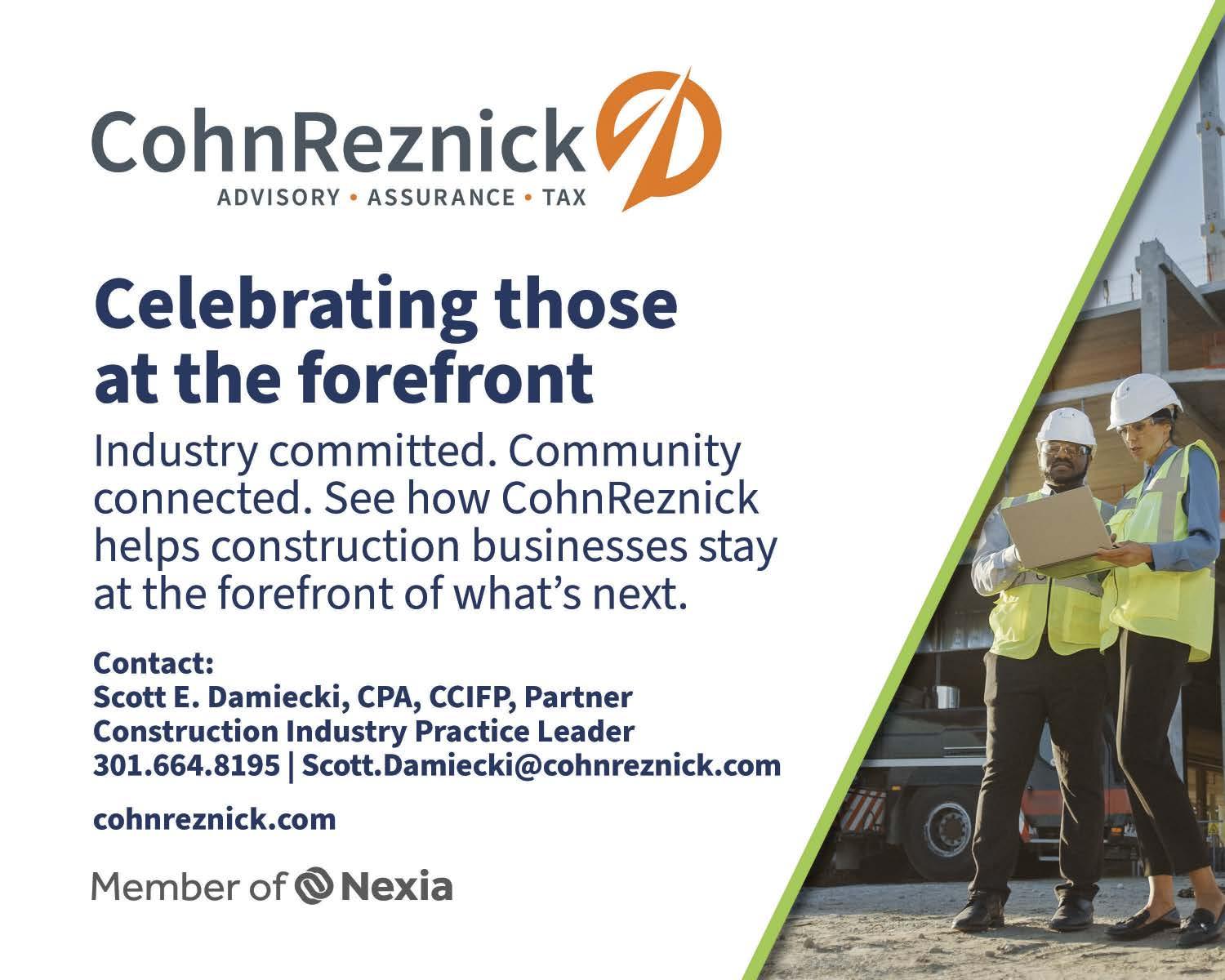
Utility & Transportation Contractor | february | 2024 74 NEWS


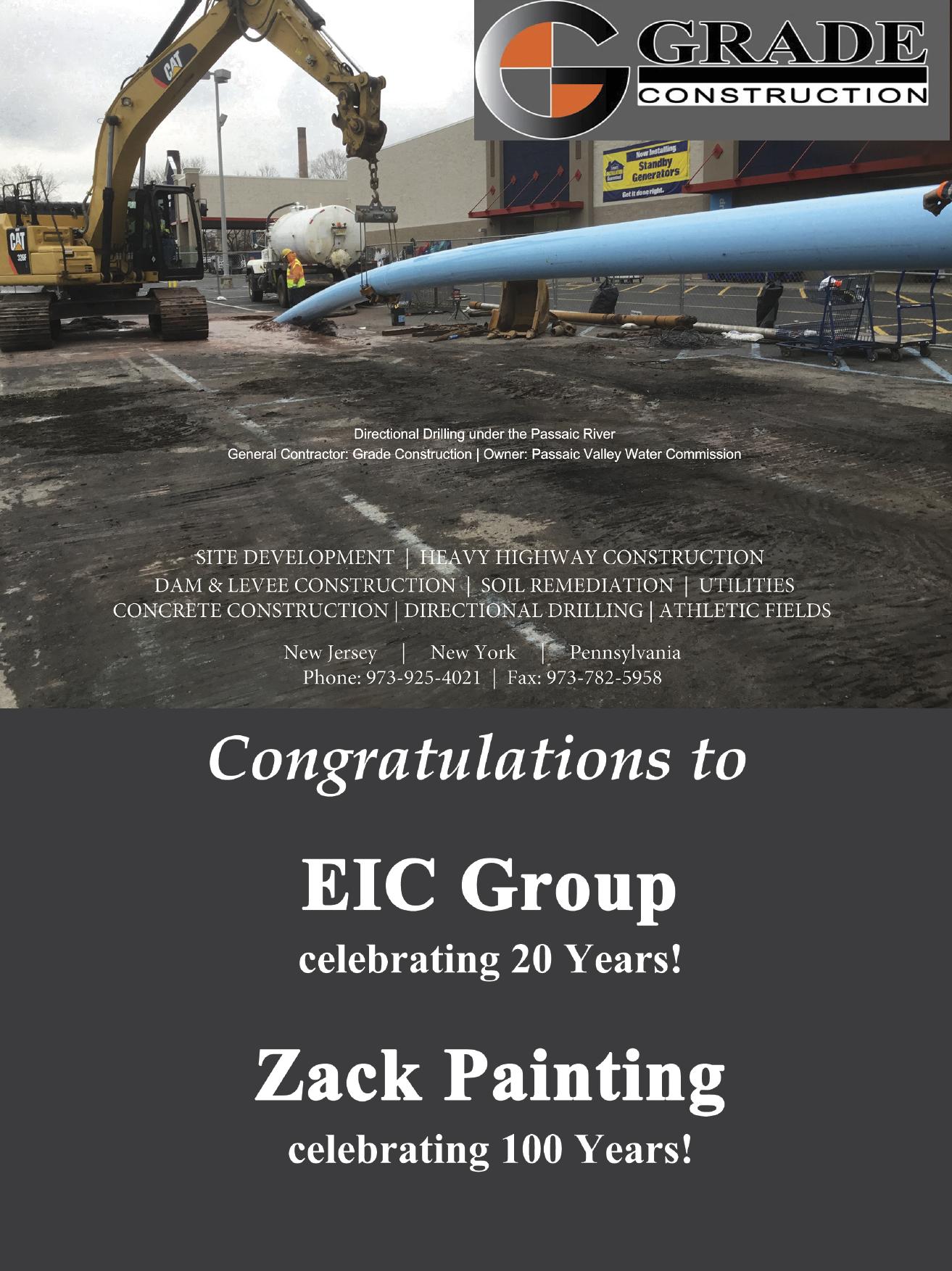

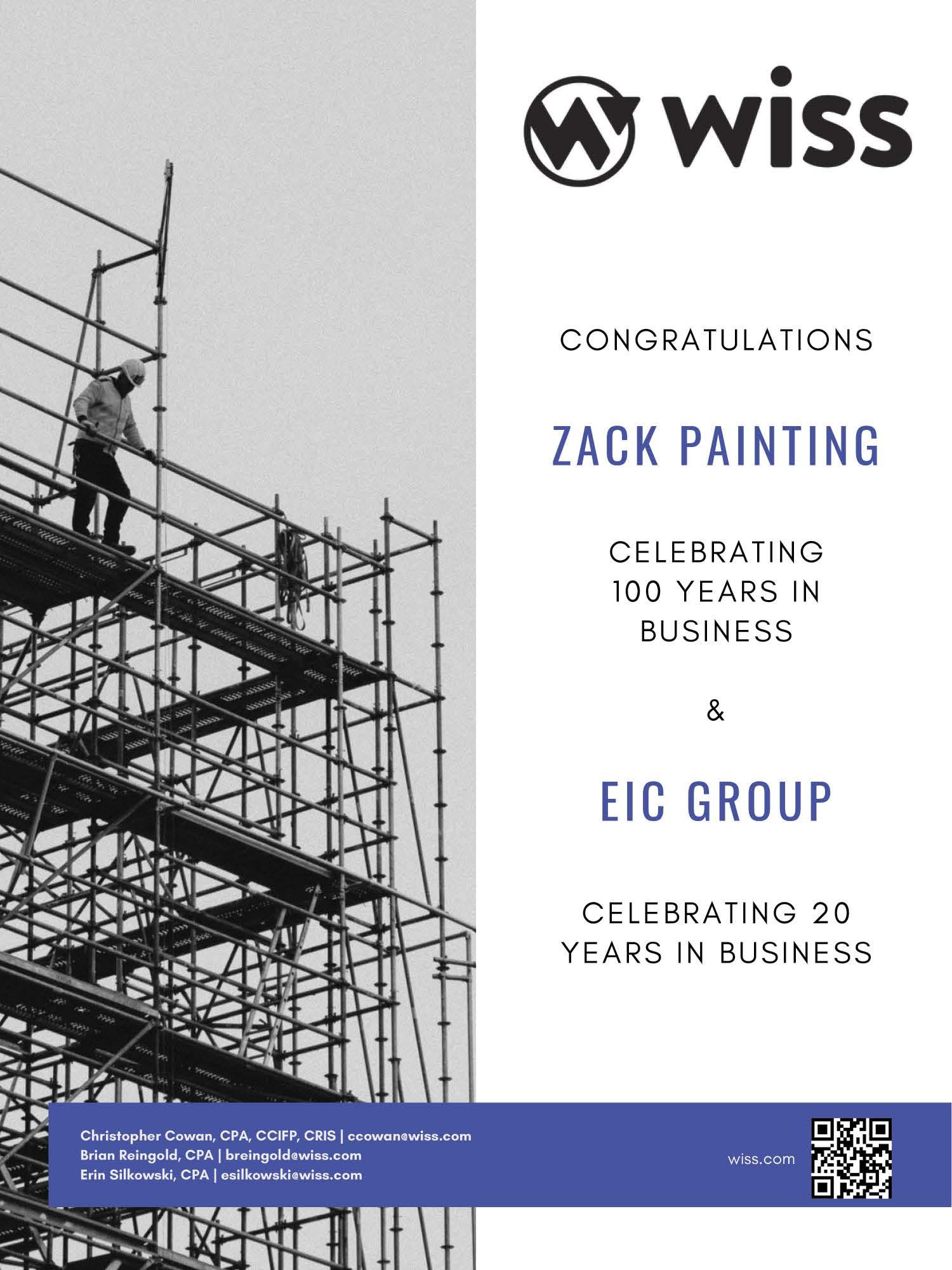
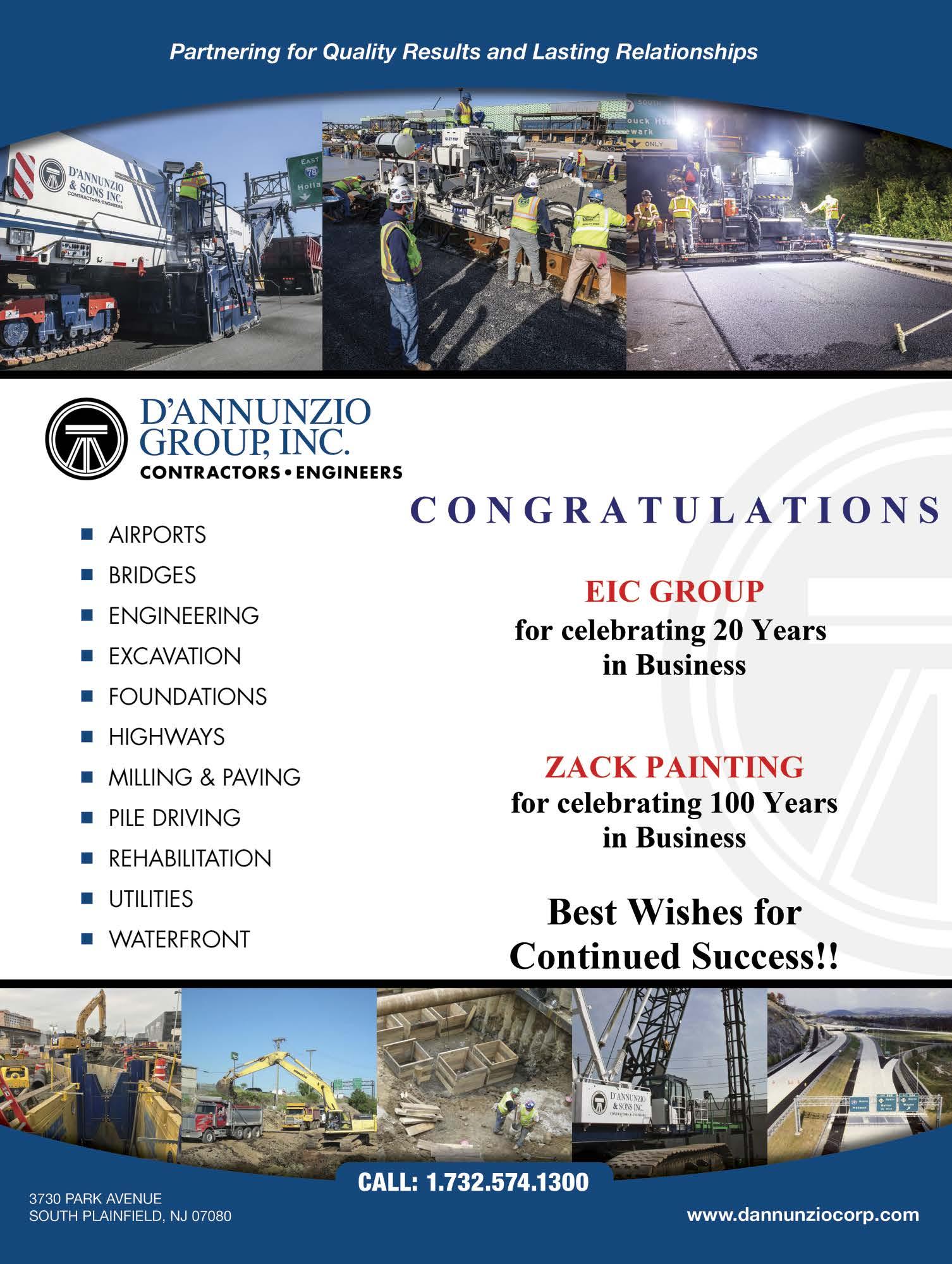

nj's water bank and transportation bank: firing on all cylinders
By: david zimmer, executive director - nj infrastructure bank
The UTCA and the NJ Water Bank, a financing program partnership between the NJ Department of Environmental Protection (DEP) and the NJ Infrastructure Bank (I-Bank), have enjoyed a close and productive relationship over the years. As past or current Board Chairs to the I-Bank respectively, both Bob Briant, Sr. and Bob Briant, Jr., have helped steer the I-Bank to expedite the review and financing of water infrastructure projects. As a result of this effort, contracts are put out to bid sooner, and municipalities are quickly able to close construction loans and receive reimbursements to pay their engineers and contractors.
Of course, efficient project processing is meaningless without adequate funds in the program to offer project sponsors. UTCA’s membership has played a crucial role in the State’s action to advance additional funds to the Water Bank including $60 million in each of the past two budgets dedicated to the DEP for this program. These monies will help ensure matching funds are on hand at the DEP to receive the projected influx of federal Bipartisan Infrastructure Law (BIL) funds, while also ensuring additional projects are financed each year.
With the assistance of DEP’s senior management and the I-Bank’s Board, the Water Bank has been proactive in planning for the receipt of these additional funds as well as the impact they would have on program staffing levels, borrower appetite, and borrower readiness. The DEP has added a number of new staffers to assist it in its technical reviews for program eligibility.
Meanwhile, the I-Bank and the DEP established a qualified pool of engineering firms to augment DEP’s staff, if and when necessary, and also developed an early technical assistance (T/A) program that is being offered free to disadvantaged communities. This T/A program will (i) help identify operational and capital project changes needed to meet the DEP’s regulatory standards and provide quality water services to their rate base, and (ii) provide outreach services to these communities to educate and inform the public and their elected officials about the availability of BIL funds as well as the benefits of using the Water Bank. This early T/A program is being paid in part by administrative grant funds from the DEP as well as a small increase in the I-Bank’s administrative fee set aside for this initiative.
The goal of the Water Bank is to certify and finance as many qualified projects as possible which, in turn, improve the quality of life and environment for all New Jerseyans, and provide
an economic engine across the State through the construction industry.
Over its 36-year history, the I-Bank has made $10.24 billion in short-term and long-term loans to water systems throughout the State. To date, the savings from principal forgiveness and interest costs for those borrowers that received long-term financing through the Water Bank program exceed $3.15 billion, or over 30% of the average project’s cost. For the past five years, the Water Bank has financed $500 million annually in active construction contracts. By the end of State Fiscal Year (SFY) 2024, it is anticipated that the Water Bank will finance approximately $650 million of additional contracts. And it is estimated that in FY2025, the DEP will make $1.2 billion available for Water Bank projects, $352 million of which is expected to be available as principal forgiveness (free) funds targeted mainly to communities that meet the DEP’s affordability criteria. Combined with I-Bank monies sourced from AAA rated bond proceeds, the Water Bank expects to offer $1.57 million for shovel-ready projects.
UTCA membership also played a crucial role in supporting the enactment and funding of the Transportation Bank. Established in 2018, the Transportation Bank, a partnership between the NJ Department of Transportation (DOT) and the I-Bank, offers low-cost loans to counties and municipalities for surface transportation projects (roads, culverts, bridges, traffic systems, pedestrian and bike lanes, ROWs, etc.). Funded with $22.6 million of TTF funds each year, the Transportation Bank has made steady progress in assisting counties and towns, both large and small throughout the State, manage their transportation construction financing requirements.
From small milling and paving jobs to larger bridge rebuild and resurface projects, the Transportation Bank has lent or allocated 93% of the TTF funds it has received to date and expects to be fully allocated of all its TTF funds before next year’s budget is approved. With potential savings equivalent to 20%-plus of each project’s cost, the financing program offers municipalities and counties the opportunity to initiate projects sooner (by providing below market rate construction financing) and increase the scope of certain projects. In addition to these benefits, the program has also seen Transportation Bank participants use the money saved to reallocate their resources to other budgetary needs.
Utility & Transportation Contractor | february| 2024 81 The Pipeline
